#an opportunity for “terrorists” to enact violence
Text
The french minister of internal affairs banned pro-Palestine protests, but the administrative tribunal cancelled that decision because banning protests just because they're pro-Palestine is illegal. So the prefecture had no choice but to allow it, and today 15 000 people gathered Place de la République, in Paris, to support the Palestinian people. Many people also marched in other cities.
We stand with the Palestinian people.
#palestine#france#The police sent dozens of vans and hundreds of cops because they were so sure the protests would be “violent” and#an opportunity for “terrorists” to enact violence#Turns out it was so peaceful that policemen were bored to tears and buying cake at nearby bakeries...
4K notes
·
View notes
Text
A bill has been submitted to the United States congress calling for a full review of the country’s bilateral relationship with South Africa following the International Court of Justice ruling that found it plausible that Israel has committed acts of genocide against Gaza.
The bipartisan bill which was introduced by US Republican congressman John James and Democratic Party congressman Jared Moskowitz this week could threaten South Africa’s prospects to benefit from the African Growth and Opportunity Act (AGOA).
The bill will still need to be discussed and passed by congress.
It states that not later than 30 days after the date of enactment of this Act, US President Joe Biden in consultation with the Secretary of State and the Secretary of Defense, shall certify to the appropriate congressional committees and release publicly an unclassified determination explicitly stating whether South Africa has engaged in activities that undermine United States national security or foreign policy interests.
It further states that the US government must provide an unclassified report submitted to the appropriate congressional committees justifying the determination upon its certificate.
US Embassy mission spokesperson David Feldmann declined to comment. The ANC and the government’s response will be added when received.
The bill accuses the ANC of acting inconsistent with its publicly stated policy of nonalignment in international affairs.
It states that the South African Government has a history of siding with malign actors, including Hamas and the Russian Federation.
The US congress bill argues that the South African government’s support of Hamas dates back to 1994, when the ANC first came into power, taking a hardline stance of consistently accusing Israel of practising apartheid.
The ANC and the South African government have however been known to have ties with the Palestine Liberation Organisation dating back to former president Nelson Mandela’s term in office.
“Following Hamas’ unprovoked and unprecedented horrendous attack on Israel on October 7, 2023, where Hamas terrorists killed and kidnapped hundreds of Israelis, members of the South African Government and leaders of the ANC have delivered a variety of anti-semitic and anti-Israel-related statements and actions,” it reads.
The US congress states that some of the anti-semitic remarks include President Cyril Ramaphosa’s statements accusing Israel of genocide.
It said that the anti-semitic statements also include International Relations and Cooperations Minister Naledi Pandor’s statement expressing concern about escalating violence, urging Israel’s restraint in response.
It adds that Pandor implicitly blamed Israel for provoking the attack through “continued illegal occupation of Palestine land, continued settlement expansion, desecration of the Al Aqsa Mosque and Christian holy sites, and ongoing oppression of the Palestinian people.
It accused the ANC national spokesperson Mahlengi Bhengu-Motsiri of anti-semitic remarks after stating that the decision by Palestinians to respond to the brutality of the settler Israeli apartheid regime is unsurprising.
“On December 29, 2023, South Africa filed a politically motivated suit in the International Court of Justice wrongfully accusing Israel of committing genocide. The South African Government has pursued increasingly close relations with the Russian Federation, which has been accused of perpetrating war crimes in Ukraine and indiscriminately undermines human rights. South Africa’s robust relationship with Russia spans the military and political space, including allowing a United States-sanctioned Russian cargo ship, the Lady R, to dock and transfer arms at a South African naval base in December 2022,” the bill stated.
It also cites that South Africa dispatched multiple high-level official delegations to Russia to further political, intelligence, and military cooperation.
The congress bill states that South Africa and the ANC’s relationship with the Chinese government and its ruling Chinese Communist Party(CCP) – which is committing gross violations of human rights in the Xinjiang province and implementing economically coercive tactics around the globe – undermine South Africa’s democratic constitutional system of governance.
These acts include what it says are ongoing ANC and CCP inter-party cooperation; recruitment of former United States and NATO fighter pilots to train Chinese People’s Liberation Army pilots at the Test Flying Academy of South Africa; South Africa’s hosting of 6 Chinese government-backed and CCP-linked Confucius Institutes; South Africa’s participation in a political training school in Tanzania funded by the Chinese Communist Party, cooperation with the Chinese global Belt and Road Initiative; and the widespread presence in South Africa’s media and technology sectors of PRC state linked firms.
“The ANC-led South African Government has a history of substantially mismanaging a range of state resources and has often proven incapable of effectively delivering public services, threatening the South African people and the South African economy,” the bill stated.
The bill accuses Ramaphosa of having declared the national state of disaster over the worsening energy crisis, “the worsening, multi-year power crisis caused by the ANC’s chronic mismanagement of the state owned power company Eskom, resulting from endemic, high-level corruption”.
It states that the persistence of Transnet’s insufficient capacity, an on-going outbreak of cholera, a failure to provide clean water to households and rampant state capture are part of ANC governments mismanagement of the state.
^Link to the bill.
6 notes
·
View notes
Text

Originally, this was going to be about Momo's fighting style, & it still is to an extent, but it became more about how ruthless Momo is.
Momo primarily relies on guerilla warfare. I think most people understand what guerilla warfare is, but I'll give a rundown of what I've gleaned to be its basics: sabotage, raids, ambushes, terrorism, hit & run, petty warfare, etc.
Some of this doesn't apply to Momo. I don't qualify Momo as a terrorist the way white nationalist groups, Islamic extremists, or private security agencies like the Wagner Group are. I think the Gotei as an institution is Horrible, but let's be real, Momo hasn't had the opportunity to enact or be complicit in that shit the way Sousuke, Genryusai, Retsu, Kenpachi, & Mayuri would be, & I don't think she would knowingly do so either, given her internal conflict over fighting Toushirou in chapter 131.





I'll look at it later how this encounter is unusual for Momo. However, the point as of now is to ascertain Momo isn't blase about the use of violence. Why else would she be weeping when she wholeheartedly believes she's avenging a loved one? It's sufficient evidence for a conscience.
Her jail brake in chapter 127 lends credence to this as well. Like, look at what she did in chapter 129.
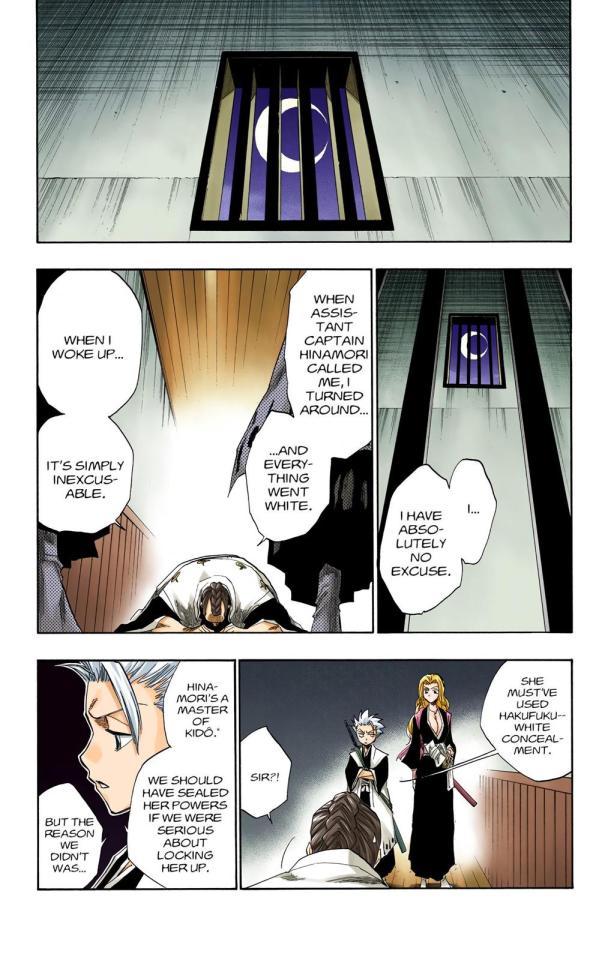

Momo very easily could've killed this man. She could've blown a hole through him as easily as she blew through several iron bars & left no witnesses. But she didn't.
I think it's safe to say Momo has a conscience & isn't a terrorist.
However, she does use guerilla warfare.
Momo set traps & ambushes. Most famously, Momo sets up a web of kidou to incinerate the Tres Beastias in 334.




Like, there's a lot that's impressive about this shit: the scale of it, the fact she's able to set it up where no one is caught in it before the right moment, the fact she's ENTIRELY undetected by like two dozen people while setting it up.
However, Momo is mostly seen ambushing people. We see in chapter 333 that her entrance is an ambush.


This is the first time we see her ambush, but it isn't the last.
In chapter 556, Momo ambushes Bambietta after Shinji is incapacitated.



We see her ambush, like, a half dozen Soldat to save Marechiyo in chapter 581 as well.


No forewarning. Just a remorseless, summary execution.
& like, as a small sidebar, this isn't out of character for her. In chapter 335, Momo explains her kidou net, but pay attention to her expressions.


Momo is entirely unbothered that she's incinerated three people. Like, she's smiling. I know she's unwell at this point & I know it's war, but she's in the same battlefield as someone who's made her life miserable for DECADES & she's smiling. Rangiku & Momo are confident enough that Momo's trap worked that their guard is lowered enough for some rumination. & Momo is bragging. After believing she's summarily executed three people.
Like, it's a fucking miracle the guard from chapter 129 where she breaks out of jail. Yes, she has a conscience but demonstrates no compunction with murder.
I think what's most impressive about Momo's capabilities as a guerilla warrior is her kyokkou.
Like, Bambietta is a competent person. We see in chapter 558, after her defeat, that the Femritter don't even approach her until after she's down.


I'm not an expert in Bambietta & I don't purport to be. However, I'm fairly certain that if Bambietta is more powerful than four Sternritter at their best, I feel like it can translate into notable reikaku.
Her skills in kyokkou are cemented early on, as seen in 335 where no one senses her or her trap, no one knows her position after her jailbreak in chapter 127, and Toushirou doesn't realize that she's busted out of his barrier in chapter 168.



Yes, it proves she's a master of kidou, but that's not the point of this post. The point is: why is she so good at kyokkou? It's because she's partial to quick & quiet. It's something she's deliberately nurtured.
Like, I think if it weren't for Sousuke arranging to have her graduate into gobantai, Momo would've been placed in niibantai or found her way into the onmitsukidou.
11 notes
·
View notes
Text
Gonzalez V. Google Questions The Liability Of Social Media Platforms With Respect To Terrorism
By Morgan Polen, University of Pittsburgh Class of 2025
October 28, 2022

Section 230 of the Communications Decency Act (CDA) has unquestionably been one of the most consequential pieces of legislation ever passed with respect to technological platforms and the Internet. It states that “No provider or user of an interactive computer service shall be treated as the publisher or speaker of any information provided by another information content provider” [5]. In layperson’s terms, the platform/website per se cannot be held liable for the speech and/or content of one of its users. For example, if someone goes on Twitter and posts a defamatory statement, the target of said statement can sue the defamator but not Twitter. It’s also worth noting that Section 230 does not apply to intellectual property-rooted claims and criminal claims [5].
This provision of the CDA is especially crucial in an era where much controversy regarding the discretion of big tech looms over the world of jurisprudence. The issue in the case at hand involves Nohemi Gonzalez, one of the many victims claimed by the terrorist attacks inflicted by ISIS in Paris in 2015. Gonzalez’s family sued Google, owner of YouTube, under the Antiterrorism Act for “promoting” a wave of violent videos and breeding an environment conducive to ISIS members and supporters [2] [4]. The U.S. Court of Appeals for the 9th Circuit argued that Section 230 protects the algorithms that are employed to promote such content. The majority did conclude that Congress, not the courts, should be the entity determining Section 230’s reach. However, the ruling produced multiple dissents, which is why it seems an opportune time for the Supreme Court to entertain this case, especially since it hasn’t ruled on Section 230 since its enactment in 1996 [6].
This case comes at a time where many issues regarding the future of technological volition are coming to fruition. For instance, Florida has recently petitioned the Supreme Court to rule on its contentious law, SB7072, which, if upheld, would prevent big tech platforms from censoring select content and people (Moody v. NetChoice, LLC). An analogous issue is posited NetChoice v. Paxton, where the U.S. Court of Appeals for the 5th Circuit upheld Texas’s House Bill 20, which greatly restricts the power of social media platforms to moderate its users; additionally, it imposes certain transparency requirements, which mandates that such platforms clearly state why they chose to take certain content down. The Fifth Circuit ruled that this law did not violate First Amendment provisions because it stifles censorship, not speech [3].
Nevertheless, it’s been widely understood that the First Amendment similarly protects one’s right to stay silent (West Virginia State Board of Education v. Barnette, 1943). Does it not then follow that big tech platforms have a right to “stay silent” and thus choose not to comment on its censorship choices?
Gonzalez is hardly an isolated incident. There’s a copious amount of First Amendment-related legislation swirling around, many issues often at-odds with one another. In a society where the freedom of expression is a hallmark, it’s necessary to remember that speech goes, for the most part, unbridled. Underlying Gonzalez is a case of particular salience: Brandenburg v. Ohio, which notedly overturned Schenck v. United States. Brandenburg (1969) clarified that speech is unprotected under the First Amendment only if it produces “imminent lawless action” or if it's “likely to incite or produce such action” [1]. When do the Internet and social media platforms become legally responsible for their users' tangible threats? Only making things cloudier is the fact that one cannot censor speech on the premise that it *might* have the ability to incite violence in the future. In other words, speech cannot be restricted before the fact. For matters involving the extent to which speech influences acts of terrorism, it’s onerous to disentangle the First Amendment from the Antiterrorism Act. Although Gonzalez was originally brought under the Antiterrorism Act, it ostensibly seems that such a First Amendment issue will be raised when SCOTUS reviews it.
Any case handling the First Amendment must be conducted with extreme care, for it only takes one ruling to send us down a vulnerable path of censorship and persecution. The Supreme Court will hear Gonzalez this term.
______________________________________________________________
[1] Brandenburg v. Ohio. (n.d.). Oyez. Retrieved from www.oyez.org/cases/1968/492.
[2] Howe, A. (2022, October 3). Court agrees to hear nine new cases, including challenge to tech companies’ immunity under Section 230. Scotusblog. Retrieved from www.scotusblog.com/2022/10/court-agrees-to-hear-nine-new-cases-including-challenge-to-tech-companies-immunity-under-section-230/.
[3] Jurecic, Q. (2022, September 16). Fifth Circuit upholds Texas social media law. Lawfare Blog. Retrieved from www.lawfareblog.com/fifth-circuit-upholds-texas-social-media-law#:~:text=On%20Sept.,and%20imposes%20certain%20transparency%20requirements.
[4] Millheiser, I. (2022, October 6). A new Supreme Court case could fundamentally change the internet. Vox. Retrieved from www.vox.com/policy-and-politics/2022/10/6/23389028/supreme-court-section-230-google-gonzalez-youtube-twitter-facebook-harry-styles.
[5] Section 230 of the Communications Decency Act. (n.d.). Electronic Frontier Foundation. Retrieved from www.eff.org/issues/cda230.
[6] Willard, L., Xenakis, N., Cooper-Ponte, A., & Salinas, M. (2022, October 5). Supreme Court grants certiorari in Gonzalez v. Google, marking first time court will review Section 230.
Inside Privacy.Retrieved from
www.insideprivacy.com/uncategorized/supreme-court-grants-certiorari-in-gonzalez-v-google-marking-first-time-court-will-review-section-230-2/
0 notes
Text
History shall be doomed to repeat itself.
[Government Cross-Party conference, the next morning, 10:18am.]
*6 Government officials are sat at the front of the large hall, which is filled up with many people, including government members, and their family’s. Fuyuhiko, Peko and Mahiru, who has Chiaki with her, are sitting amongst the crowd, looking forward. Hajime and Kyoko are sitting in front of the crowd on a small white desk.
Official 1: Of course, now that we’ve made sure of all the details, the Government would like to bring up another main issue, in regards to you as the Future Foundation.

I take it it has to do with the actions of Nagito Komaeda, sir?

...(Dammit...)

...(So many terrible things have happened lately...)

...(And even after all of this...)

...(We still have to talk about Nagito...)

...(Shame, but we do need to cover this I guess...)
Official 1: Indeed it is.
Official 4: Recently, over the course of the last few hours when we got all our details in order after the…y’know. We discovered the victim, AKA, the girl who died in that crowd, was a member of the UUV terrorist group that attacked us and held us hostage last night. This brings another factor into the issue.
Official: 2: That’s not an excuse for murder. No matter how bad this girl might have been, the Future Foundation fight against the ideas of violence. To enact such a violent act upon an opponent of theirs…
Official 3: I’m not going to defend the Foundation’s honor on that front, because you are right, it isn’t an excuse. However, the more I analyze the situation, the more I notice one outlying factor of it.
Official 1: What would that be?
Official 3: Reports have shown that the Foundation immediately went after Komaeda after the incident happened. I’m as of such led to believe that he wasn’t acting upon orders, am I wrong in that regard, Mr Hinata?

That is correct. Nagito Komaeda acted completely on his own.
Official 3: Can you think of anything that may have led to him doing such a thing?

He’s very close to a Branch Chief in our collection. Said Branch Chief was recently kidnapped by a group of villains who we as a collective have been fighting for a while.

He lost control and well...This situation arose from it.
Official 3: I see...
Official 5: If you ask me, I think we should table the issue.
Official 6: Table it? You mean drop it? Do you realize just how much the Foundation’s reputation has been tarnished?
Official 5: We have the power as a government to clear up this misunderstanding to the public. Many have lost faith in the Foundation just for this one act, despite all they have done for us. On top of that, need I remind you who it was that protected us and our family’s from those terrorists in the UUV last night? We can’t just ignore that fact.
Official 6: Hm...You do have a point...my children are only alive because they provided us an opportunity to escape.

...!
Official 1: So are we all in favor?
Official 3: I’m fine with this outcome, but only on the condition the Foundation promises us that this will never happen ever again.
Official 2: Indeed. We’re replacing our faith in you. Make it count.

Thank you.
*The audience claps as Kyoko smiles and nods. She picks up her stuff and prepares to walk away, tapping Hajime on the shoulder. Hajime stands to his feet, but doesn’t move...

...

Hajime, let’s go.
Official 1: Is everything ok Mr Hinata?

...Yes, everything’s fine...It’s just...

There’s one more thing I want to talk about before I leave...
Official 5: Go on?

...Why is it, that you keep referring to Ayumu and his allies as terrorists?
Official 3: You mean the UUV?
Official 6: What else would we call them? It’s just what they are.

...Is that so? Well, I can tell you this much, Ayumu Fujimori probably said the same thing about you.
Official 6: Are you trying to start something with us!? Do you want us to take back your pardon?
Official 5: Calm down! Let’s hear what he has to say...
Official 2: The floor is yours, Hajime Hinata.

Thank you...

Hajime...!

But the way you’re reacting, disagreeing with each other, and having to press your decisions with each other. This in itself, is proof!
Official 3: Proof of what?

Proof of how divided the world is!

Not an awful lot of good came from the tragedy, but if anything good came out of it, it was all the people who had yet to give into Despair…You guys in the governments in other words…Uniting together, to triumph over a common issue!

Could you not say that what happened last night was a common issue? You had to work together to overcome that by yourselves, and you’re failing to see the big deal with it!

That idea is the EXACT reason Ayumu Fujimori even kidnapped you in the first place!
Official 4: I still don’t understand.

Then let me start from the beginning because I’m not stopping until you do understand.

This issue isn’t just about the 6 of you either. It’s about every person in this room. I’m not gonna stop until I make ALL of you understand!

So, I’d like you to just take a minute and let me tell you a story...It’ll give you some background...And I hope your kids who are here today will listen especially closely if they’re to follow in your footsteps...
Official 6: Ok, this is just-
Official 4: Shush!
*Hajime picks up the table and moves it and the chairs to the side, to give himself more room.

This all starts off with a young boy...He lived in a society, wherever since he was young, his life has been a struggle, but he’s always looked up to a certain powerful empire almost.

Though he was met with a lot of tragic events, he pulled through them because he had a collection of people that he looked up to. And eventually, with some effort, that admiration paid off, as he was able to work directly or indirectly, with those people.

However, things became increasingly apparent to him as time went on, how little the people he admired cared about him, and how willing they were to cast him aside when he wasn’t needed anymore.

Not only that, but that person had friends who he wanted to walk down a road with, but due to their different status, and how that person wasn’t as skilled or talented as they were required to be, things went downhill from there...

Eventually, the real slap in the face was when they first tried to fight back against the power. And the power told them to their face just how little they mattered. After that, it was the last straw, and the person decided to undergo a transformation.

They volunteered for an experiment, one that would give them power, power to rise up against the power, and prove that they were worth giving a damn about! However, this proved to be the biggest mistake of their lives.

And once they started to feel comfortable...They watched their best friend...the person that they had been fighting and doing all of this inhumane stuff for...die right before their eyes.

After that...they fell into Despair...and they wrought nothing but destruction and chaos...unable to live with the power that they had, they faded and anything that was left of their original personality was gone...
Official 1: That sounds tragic...but may I ask, who is this person that you are referring to?

Actually, sir, I think you’ll find that this story actually refers to two people. The first is Izuru Kamukura, leader of the Ultimate Despair alongside Junko Enoshima, and the Ultimate Hope who started the tragedy.

AKA, myself...
Official 5: We are aware of your situation Mr Hinata...We don’t hold it against you...

Thank you...But as I said, this story applies to another person...

And that’s the leader of the UUV “terrorists” who attacked last night. Ayumu Fujimori.

So do you see my point?
Official 6: Hardly. All I see is that it’s common for terrorists to feel useless. No offence.
Official 3: Clearly you don’t understand. He’s saying that his actions and Fujimori’s actions are the same. Hence, due to our incompetence, one way or another, history has repeated itself, and we’re lucky that we avoided another tragedy.
Official 4: OUR incompetence? You’re saying this is our fault?

This label that you’ve given Ayumu and his allies. Terrorist. Murderer. Villain.

To me, all of it feels nothing more than an excuse to dodge the question of why he’s doing it in the first place. You all seem perfectly satisfied to just simply believe Ayumu did this to you because he’s “evil.”

So I’ll ask straight up. Last night, how did it feel? Being held hostage before you struggled to fight back.
Official 1: ...Well, if you’re legitimately asking us that, I will be honest. It made me feel weak...powerless...scared...Not for myself necessarily, but I just wanted my wife and children to make it out safely.

Thanks for the honest answer. And congratulations...

You’ve all now experienced what it’s like to live a single day in Ayumu Fujimori’s life, and the life of the UUV, after you unintentionally kicked them out and left them for dead.

After you got to a point where you felt you no longer needed to rely on each other, and simply chose to separate yourselves from each other, you also laid him and his friends off, not realizing the situation that they in before, and what you unintentionally damned him to!
Official 4: That is...
Official 6: The Tragedy and that whole situation was years ago! Do you not think it’s fair for Governments to support people’s rights? Yes, maybe we can’t help everyone, but we help the people who deserve to be helped!

So...You’re saying there are people out there who DON’T deserve your help!? Ayumu Fujimori was a citizen of this country, and I REFUSE to let him die a menace because you couldn’t be bothered to help him out!
Official 6: Do you think it was an easy decision laying off all those people!? I understand your point Mr Hinata, but you have no idea how complicated this situation is! You can’t hope to understand! It would be chaotic!

I’m the entire reason the Tragedy started in the first place! What about Chaos would I not understand!?

On top of that, I’m a Branch Chief in charge of loads of people at the Future Foundation, so I know what it’s like to be in your position.

And if I was, then I know I’d still find a way to ensure everyone’s happiness!
Official 6: ...

What ticks me off the most is not the fact that you treat Fujimori and his allies as if they’re just villains. You, even before they became terrorists, never treated them like people! So you haven’t considered one key fact.

Ayumu knew right from the get go that what he was doing was wrong. He knew he was a bad person because of the things that he did. And I know how it feels to live life with a mountain of trauma and regret.

But even though he knew that he would be hated for it. Even though he knew that for the rest of his life, he would be viewed as nothing more than a tyrant, he STILL went through with it!

He suffered great losses trying to stop you! He BLED trying to stop you! He DIED trying to stop you! And none of you, not ONE of you have stopped for even a second to just ask…!

“Why!?”
Official 1: ...
Official 2: ...
Official 3: ...
Official 4: ...
Official 5: ...
Official 6: ...

I want to go about saying this in the most polite and respectful, yet most forceful way that I can, but I’m afraid I’m gonna have to give it to you straight. When you do the things you do, like close borders, manage country’s and everything else you do in the government, you people only ever consider who will benefit from it! You never give a second thought to the people who might suffer because of your decisions!

Ayumu and I might have endless talents, but you’ll have more power over this country than we ever will! We’re strong, but we can’t move borders or control banks! But YOU can! Yet, you think you can’t extend your reach to people who are left behind!? People who are suffering because you abandoned them!?

You have to do BETTER, sirs and ma’ams! Because in case my little story didn’t give it away, if you don’t learn from this experience, it’ll only be a matter of time before ANOTHER misguided kid finds a problem with you, undergoes a fatal surgery, and overthrows you AGAIN! And if you think Kamukura and Fujimori were bad, HOO BOY, you’re not gonna wanna see Jon Doe or Jane Doe!

...

...

...

...

...

You people, without question, have the power to make the changes people want to see in the world, and yet you deny them that right. I understand that there’s a limit to what you can do. You are just people. But you’re a collection of very powerful and influential people. And you can make decisions that a huge chunk of the population of the world can’t make!

So let’s make it clear that the people who held you at gunpoint last night were not people who were on Ayumu’s payroll. They were volunteers, who believed in his cause and his fight SO MUCH they defied YOU, the most powerful people in this country!

They fought to save this country! They took hits for the is country! They bled for this country! No one, not in the least you people, have any right to say they had no right to fight for this country!

Because they’ve done a lot more service for this country, and the world as a whole, than I can ever see you 6 and everyone else here ever doing! I am as of such, imploring you, to PROVE ME WRONG!
Official 1: ...
Official 2: ...
Official 3: ...
Official 4: ...
Official 5: ...
Official 6: ...

...

Sorry...I know it sounds like I’m not being fair...and maybe I’ve overstepped my boundaries...Maybe...

So I’ll stop here. But before I do, let me just tell you people the exact same thing that I told Ayumu Fujimori on the first day that we met...

It’s not even just a matter of wanting to atone. Choosing to do the right thing is the first step into rebuilding an upstanding community. Into rebuilding a society, even when it almost reaches the brink of collapse. But it can only be done at an individual level. That’s what sets the good guys and the bad guys apart.

So? Which one are you going to be?
*Everyone in the hall, not just the officials, are left in a stunned silence. Hajime politely bows, and makes his exit, with the others following behind.
#danganronpa survivor#danganronpa#danganronpa 2#dr2#danganronpa 1#dr1#hajime hinata#kyoko kirigiri#mahiru koizumi#chiaki nanami#fuyuhiko kuzuryu#peko pekoyama#misfortunes revenge arc
15 notes
·
View notes
Text
Sky
Perhaps this will be hard to read. Laments often are.
It may bring you comfort, or it may make you angry. It may make you think more of me, or less. It may offend you. Rest assured, it offends me.
So be it.
Once upon a time, there was a man who spoke of torture as a good in and of itself, to be pursued whether it was effective or not. Who promised to use the power of the state to enact violence upon scapegoated religious and ethnic minorities. Who insisted upon framing our struggle against Mideast terror groups in the same religious terms the terrorists themselves insist upon. Who praised himself for nursing petty grudges, for treating revenge as justice. Who threatened the free press with retaliation for reporting certain truths about him. Who bragged about sexual assault. Who mocked people more brave than himself and called their bravery weakness. Who lied seemingly without strategy, as if lies were good to tell only for the telling, who showed a shocking indifference to the very concept of truth. Who praised brutal dictators for their brutal methods. Who seemed (and seems) to be receiving shadowy support from a brutal dictator. Who claimed dictatorial power for himself.

This is fine.
He appeared entirely confused about the basic facts of geopolitical reality, or of how our government works, or even of the function within our government of the role he proposed to take on. He had a clear and obvious history of fraud and hucksterism, of enriching himself at the benefit of others with less leverage, and was even engaged throughout his campaign in a lawsuit for defrauding college students, since settled for $25 million dollars. He speculated with frightening casualness about destabilizing actions: proliferation and even use of nuclear weapons, defaulting on our debts and our treaties, backing out of our most long-standing alliances. He publicly called upon the intelligence apparatuses of foreign governments to intercede in our election on his behalf, and it seems increasingly likely they may have obliged. He whipped his crowds into frenzies, then directed their ire toward journalists reporting the event, many of whom he threatened to prosecute once in power. He offered to imprison his political adversary, to the delight of his chanting crowds, who wore t-shirts decorated with the flag celebrating the war to preserve American slavery, decorated with vulgar slogans of violence and rage. He promised to steer us directly into the deadly heart of the oncoming climate catastrophe; having claimed the work of men more intelligent and knowledgeable than he was nothing but a Chinese hoax, he sneered at the very idea of new energy sources.

This is fine.
That’s a short list. It’s a hell of a short list.
But wait, listen: The people went for it.
Tens of millions of people voted to make him the most powerful man in the world. He will soon have the ability to blast the planet to an irradiated cinder, if he sees fit. He will continue to run his business, which appears to involve sitting in a golden throne and putting his names on things. He's given every indication, despite some laughably thin feints toward divestment, he will run that business from the Oval Office. Maybe he’ll even put his name on new things, like laws. Laws: a whole new product line for Trump International, and a potentially lucrative one. He owes the banks of foreign powers millions and millions of dollars. One wonders what laws they’ll want passed. Word is, his first foreign trip will be to visit Vladimir Putin. Heigh-ho.

His party is in control, too. They don't seem bothered by any of this. They're a bit more focused on providing checks and balances upon ethics watchdogs who have pointed out their party leader's multifarious and historically unprecedented infractions. They'd rather ignore those, so they can immediately—immediately—get down to the serious business of divesting millions and millions of the most vulnerable people in our society from the only chance they have at affordable health coverage. They plan to replace this program with something...someday. Their speculation so far indicates they will be replacing it with the opportunity to save up hundreds of thousands of dollars to pay for medical bills if you need them someday, or, if you don't have hundreds of thousands of spare dollars, to maybe go screw yourself. So, a lot of people are going to die in coming years, that would otherwise have lived, and they're rushing to make it happen. My, look at them laugh.

Republican lawmakers sign legislation to repeal ACA and defund women's health care access through Planned Parenthood, January 2016
Meanwhile, they're ignoring as peccadilloes the caricatured infractions of a man who intends to keep his own private security detail around him, who expounds upon provable lies, and then when exposed simply doubles down on the lie, who is considering throwing the press out of the White House, and other maneuvers straight out of the dictator handbook. It's really something to see.
It's a new order, trumping the old. Isn't it great again?

Laura Ingraham, speaker at the Republican National Convention, 2016.
It’s hard to understand what people hoped for from him other than this. It’s hard not to assume they were responding to the shockingly frank bigotry, his promises to return to an earlier time, the knowing use of slogans used byracists and fascists of days past. These are certainly what seemed to generate all the most popular applause lines.
But I don’t want to think that of my country or my fellow citizens. I really want it to be something else. Let us consider other possibilities.
Many seem to think that a great thing about him was his frankness. They liked that he “tells it the way it is.” Then again, those same people seemed most likely to think that he didn’t really mean his more shocking proposals. It’s a bit confusing, then, parsing what is meant by ‘telling it like it is,' as it appears to rely on selective trust in insincerity. Many voters, excited by promises to “drain the swamp,” but now disappointed by the recent appointment of a Goldman Sachs foreclosure kingpin to Treasury, of a Putin-connected oil executive to State, and by other signals the new president has given about his eagerness to rob us all blind, have been admonished by a key advisor for taking his words so literally.
The 'alt-right' Neo Nazis and the KKK are very excited, for what it’s worth, about the more shocking proposals, and they remain confident our new leader meant every word.

You're really going to want to go to video on this one.
Some people thought he would be less likely to make them pay more in taxes, I suppose. So perhaps at last now we know the answer to the old hypothetical about whether we’d be willing to travel through time and sacrifice our lives to prevent the rise of a self-professing tyrant. Answer: We wouldn’t even suffer a hypothetical increase in our income taxes.
I'm told folks voted for Trump because they were tired of being called racist. I imagine that was hard for them—who wants to be considered racist? If this complaint is yours, I imagine reading this (if you're still reading) is also hard. I sympathize; it's not particularly easy to write. But then again, the response seems an odd retort to the complaint. If your persistent problem is people keep telling you there is spinach in your teeth, you might consider getting a mirror and taking a look, rather than voting for the Jolly Green Giant running on a platform of outlawing all floss. And, perhaps, if it is painful to be considered racist, consider this: it may be all the more painful to live under racist oppression.

KKK Newspaper, The Crusader, endorses Trump.
Many seem to have mainly enjoyed that he wasn’t Hillary Clinton, and it’s certainly true to say many concerns and criticisms could be levied against her. But the man they voted for as an alternative already stood actualized as the cartoon parody of any potential danger she may have hypothetically posed. Bad judgment? Corruption? Fraud? A proclivity to violent retaliation? A worry about temperament? Untrustworthiness? Lack of transparency? It’s hard to believe this all had much to do with Hillary Clinton and her faults. Hard to believe this list of concerns would yours, but your acceptable alternative would be Donald Trump.
Or maybe they believed the more lurid stories, the debunked, the ridiculous. Hillary’s murdered 80 people close to her. She invented cancer and put it in your cell phone battery. She is secretly seven tiny demons all stacked up in a pantsuit and glued together with the blood of aborted fetuses. She controls the Yosemite supervolcano, along with a cabal comprised of George Soros and 17 other Jewish industrialists. I don’t know what all. I know there are people like this, who have seceded from objective reality into a dystopian alternate dimension, where they can perhaps supplement the powerlessness they feel in their lives with the comfort of false control, of being one of the few with the secret knowledge unavailable to the masses. I don’t know what to do with them, because they live in an alternate dimension. And, it must be said, I don’t think there are 63 million of them.
So here we are. In grave moral and physical danger. All of us. And for what?
I’ve heard the same line again and again since the election: “America isn’t a different country today than it was before the election.” Jon Stewart trotted it out. I think I heard it from President Obama.
I fear I agree with the statement. I’m puzzled, though, because I think it is meant to be reassuring, to think we’ve always been the country capable of such a choice.
The statement doesn’t imply that we’re still great. It implies that we were never good.
It has to be admitted, people responded to Trump for what he is. Which means we are left with the statements and proposals by which he distinguished himself. And millions of us—tens of millions—preferred him specifically for his points of difference. Excited by his promises to return us to a time when our system existed only for certain people, and the preferences and needs of all others were beneath consideration, or at least willing to overlook that, in favor of some material or policy advantage somewhere.
And ultimately, the reason is immaterial. A man ran for president promising to use the power of the state to bring violence to scapegoated religious and ethnic minorities, to make America torture again, to make it easier for an already-militarized police force to employ violence, who praised dictators, who bragged about sexual assault, who praised vengeance as good, who promoted as fact debunked conspiracy, who stated his determination to ignore as conspiracy what the data overwhelmingly indicates is an oncoming extinction-level event. There was some other reason to vote for him, that allowed you to overlook these facts? Save it, please. It really doesn't matter. It was a bad reason. We have seen this movie before.
Historians have a word for Germans who joined the Nazi party, not because they hated Jews, but out of a hope for restored patriotism, or a sense of economic anxiety, or a hope to preserve their religious values, or dislike of their opponents, or raw political opportunism, or convenience, or ignorance, or greed.
That word is "Nazi." Nobody cares about their motives anymore.
They joined what they joined. They lent their support and their moral approval. And, in so doing, they bound themselves to everything that came after. Who cares any more what particular knot they used in the binding?
What am I saying here? Am I saying we are Nazis? The answer, I suppose, has to be 'no.' Only Nazis are Nazis. We are Americans. But what that will mean in decades to come—'American'—has been thrown into hazard. We used to be the sort of place that doesn't allow Donald Trumps to happen. That's gone now, along with that specific sort of trust the world once had in us. In any case, what we seem to now be trying to redefine 'American' to mean seems like a rough beast, and omnivorous.
Democracy reveals us by our choices and our actions, not our intentions. We are what we are.
And Donald Trump will be president.

As a result, I’m bereft. Bereft of the country I thought I was living in. Bereft of the people I thought I lived among. Bereft of what I believed was a shared direction despite divergent opinions. Bereft of a belief in the possibility of a common dialogue or even a common reality. Bereft in confidence in basic decency and intelligence. Bereft of the spiritual heritage I was born into, because of course Trump’s most enthusiastic supporters were white Christians. Christians voting for a new Herod with the power of a Caesar is a pretty good joke for the universe to tell, I suppose. He’s even promised to go after the (anchor) babies.
My translation of the Bible is full of all this toff about loving your enemy, about how love of money is the root of evil, about showing hospitality to the widow and orphan and the immigrant, and admonishments against drawing the sword lest you die on it. My reading of the Bible doesn't ask "but who's going to pay for that?" My reading of the Bible suggests to me that if you wish to pretend to care about babies unborn, maybe you shouldn’t be so hostile to the idea of making sure they’re cared for once they are born and inconveniently and expensively needy, and perhaps you shouldn’t make so many of their mothers into the welfare-queen boogie-men of your whole realpolitik, and perhaps you shouldn't make weaponry a right more important than health and food. Maybe healing and wholeness and liberty is something that should be available to even the pagan. Maybe the door is open for the tax collector and the prostitute and the Samaritan. Maybe, unencumbered by the overweening need to be perceived as correct in every moral posture, they've even entered that door ahead of us as we do our best to hold it shut against unworthy access.

Maybe I got a trash translation. Maybe the other ones are all about the joys of using political power for your own aggrandizement instead of the call to self-sacrifice for the benefit of others, about the dangers of anchor babies and welfare mothers, about how paying tax money toward a shared life is tyranny, about how with terrorists you have to kill the families, folks, believe me, kill the women and children, you’ve got to go after the families, and we’re gonna torture again, folks, we’re gonna torture, believe me…
You know what?
I believe him.
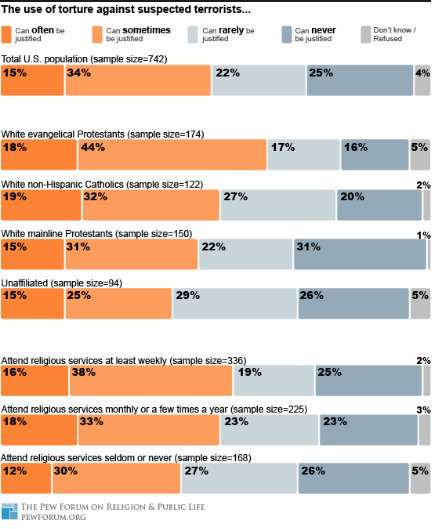
WWJD Check: White Evangelicals are the group most likely favor use of torture by a military superpower.
* * *
You wake up and the sky is gone. At times that’s how it seems. You wonder at it: how could there not be a sky? What will become of us now, in this world without a sky? Was it ever there, or did we just imagine it there, as an exercise of collective will?
And then you talk to other people who insist the sky is there. They say: It’s not gone, it’s just red now. Don’t be a sore loser, just because you didn’t want it red. Accept that we did want it red. It’ll be fine if it’s red. And anyway, the banks seem to like it red. Move on with your life. Suck it up. Hope that the red sky will be as good as the blue one.
But the sky isn’t red. It’s not anything. It’s just … not. It is a not-ness. An un-sky. A nothing.
And then you start talking to people who laugh, not without compassion, that you ever fell for the idea there was a sky. They say: That big vast emptiness? Oh, yes. That’s always been there for us. Is it there for you now? How… interesting. We can tell you a thing or two about that emptiness, if you’d listen. We’ve been watching it an awful long time.

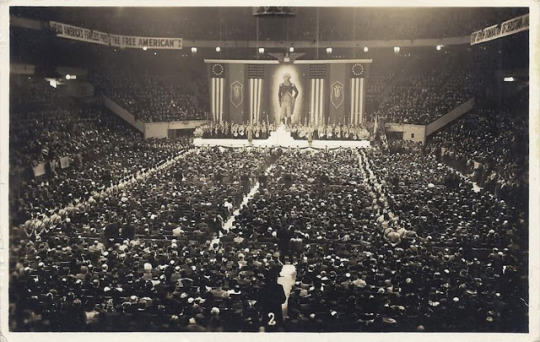
American Nazi Rally, Madison Square Garden, 1939
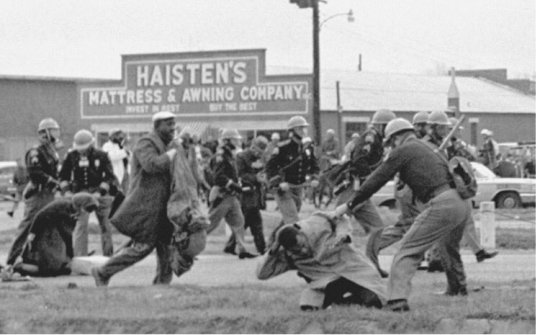
Future Georgia Representative and Civil Rights pioneer John Lewis, beaten by a state trooper on "Bloody Sunday" in 1965.

Oh. Will he. Will he do that.

The sky is the future. Or it was the future. That’s how it seems, at times. How odd, to speak of the future in the past tense.
But the past tense presents us with further troubles. It seems the past is gone, too.
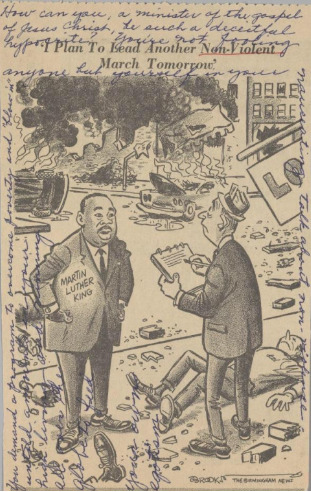
In 1965, everybody thought King was great, and nobody tried to dismiss
him by tying him to violence.
Growing up, we were taught that we were a kind and good and just nation. The story we were given was of a nation born of a righteous cause, not quite made perfect by the godlike men who forged it, but honed to apotheosis over the decades that followed. The destruction of the native nations and their people, ah, tsk, a shame, we’d change it if we could, but unfortunately in the past and unrecoverable. Slavery, a dark stain, but by now expunged entirely. Jim Crow, its shameful cousin, absorbed by a saint named King, who led a boycott (a pleasant and polite and non-disruptive one, it seems, in our memories), then stood on some stairs to give a universally-admired speech about his dream of inclusion, and then, his work seemingly accomplished, having seemingly changed minds forever, ascended harmlessly into the clouds.
Somehow we are never culpable. It was always a long time ago. Mistakes were made, but we’d never make them ourselves. It was always somebody else holding the gun, the whip. We arrived here after that, you see, born blameless, without any afterbirth or shock, into the Greatest Country in the World. Our holocausts we absolved ourselves of, because they served to illustrate not the evil we’d done, but how far we’d come from it. We stood on the prow of the ship, looking forward as we cut new water, not aft looking back at whatever may have been churned up in the wake. Not big on the rear-view mirror, us, not fans of the over-the-shoulder glance. We’d tell ourselves stories of what lay behind. We’d imagine ourselves into those stories of darker times, making ourselves the protagonists. We would have been the ones to build false walls in our home to hide slaves. We would have marched with King. We would have spoken out against the Japanese camps. We would have stood at Stonewall.
Our moral arc bends ever toward justice; an inevitable thing. That was the story.
America was great, because it was good. All the old hits.

People still alive can remember this sort of thing very well.
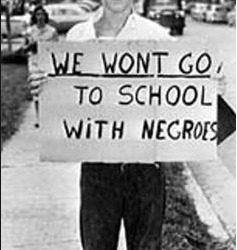
This kid is probably still alive.
As are most of his classmates.
As are the children with whom he refused to attend school.
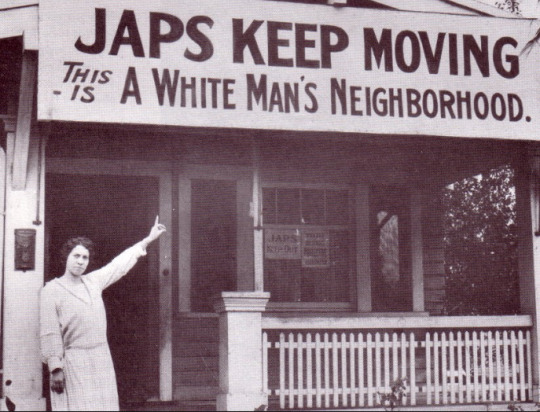
This also happened within living memory.

It's amazing what people consider communism. I mean back then, of course.
Sometimes you’d hear stories about a random injustice or brutality. A policeman who had become a little too enthusiastic. A bad apple, and surely justice was served. If not, it’d have been in the papers You’d hear about it in the papers if it hadn’t been. A gay teen beaten to death in a cornfield. A car with the banner of the struggle to preserve human slavery on the bumper sticker. The KKK marching again, how quaint.
Ah, you’d think, if you were like me. We still have some work to do. Cleanup on aisle seven.
Technology has changed that. We see with new eyes now, unless we choose not to. We see videos, dozens and dozens of them now, new ones each week it seems, of police shooting unarmed black people. Again and again and again and again. Can you remember all the names? I can't anymore. And I ask myself: why can't I?
We see the speed with which so many seem willing to seek and find the nearest handy reason the victim deserved his or her fate. We see the news organizations find a Sunday School photo for the shooter and a mugshot to represent the victim. We see acquittal and acquittal and acquittal. We see failure to prosecute.
And, perhaps, we begin to wonder.
We see the people protesting, unarmed, asking only that their lives be thought to matter as much as another’s, and we see the stormtroopers with their massive guns and their tanks, arrayed against a civilian population almost reflexively, like defenses in an organism’s bloodstream mustering against a disease. And we wondered, perhaps: why do they look so much—so exactly, if we’re honest—like an occupying force?

We saw the white ranchers seize government land, pointing their guns directly at law enforcement officials, speaking openly of armed insurrection against the government, of revolution, of war. We saw them, later, seizing a government building. They weren’t protesting after centuries seeing their children and brothers and sisters killed without consequence by authority. Rather, they didn’t want to have to pay a grazing fee. Was it with surprise that we saw it: law enforcement seemed less frightened of these white men and their guns than they had an unarmed black woman in a sundress, or a 12 year old boy playing in a park? Were we surprised to see they seemed so level-headed in this situation, so much less likely to respond with immediate lethal force?
Why, those fellows with their arsenal didn’t even get convicted. They were less threatening to the system, apparently, than a man, arms up, lying on the ground next to his autistic ward begging not to be shot. (He was shot.)
We might contrast to the treatment of the protesters at Standing Rock, and wonder…is the Holocaust against native people relegated only to the past? Would we change it, if we could?
We wonder: Are we seeing the system breaking down, unable to cope with new challenges? Or are we seeing a system working exactly as it’s always intended? Do we as a collective of 'white' people secretly want the police to control brown people by force? Are we secretly hoping that force will prove lethal, only occasionally enough to soothe our consciences, but frequently enough to promote an order less immediately costly, than the pain of culpability, than the justice of restitution?
If not, why are prosecutions so rare, and convictions even less so?
If not, why aren’t we protesting these killings? Why aren’t we in the streets?
Do all lives matter? If so, why wouldn’t we act like it?
White Christian America reveres Dr. King, it should be noted. You remember him—the peaceful guy who gave the speech that ended racism. If Facebook and newspaper op eds are any measure, we white Christians can’t stop bringing him up, almost as a cudgel, an admonishment to those today who would dare ask for their own human dignity, for not doing it as antiseptically as we remember it being done by him. And perhaps people begin to wonder: Why was King enshrined as 'the peaceful one' only once he was peacefully dead? Is King’s being safely dead our favorite thing about him? These days, we white Christians can claim to have brought his dream to reality (the white guy is usually the hero of the story in the movie), and Dr. Martin Luther King Jr. will not protest—and we white Christians don’t like protest. Heavens, no—it’s so divisive. Dr. King, he wouldn’t approve of this protest, nor that one, and certainly not that one. His protests were so polite! Why, nobody had any problem with them at all! Dr. King agrees with all of us in white Christian America so much, these days. Oh my, he never stops agreeing with us. Just ask us; we’ll tell you. Yes, and what ever happened to Dr. King, anyway, after he gave that speech that ended all inequality forever?
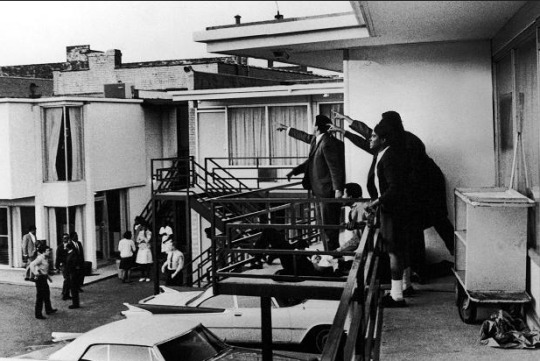
But no matter, I told myself. That’s a dying strain, it's not who we are these days. That’s just a few bad apples. We’ve made so much progress. They’ll exhaust themselves in a final futile sputter. We’re just about to turn the corner. Sure there are racists, bigots, white supremacists, lost-causers, and they're loud, but they're dying out, and they know it. They'll eventually run somebody on an overtly racist platform, and they'll lose huge—I disagree with Republicans, but most of them won't stand for stark white supremacy, surely, and obviously Christians won't be able to align themselves with it — and we’ll show them it’s no use, and they’ll retreat, retrench to even positions even more compromised, less fortified, further back, smaller, diminished. We’re a better country than that.
But then Donald Trump, a half-rate and transparently obvious bullshit artist, a greasy reality TV star most skilled at demonstrating his manifest ignorance, promising mostly the goodness of violence and the strength of vengeance, offering to return America to an earlier time, railing against the inconvenience of practicing sensitivity toward the perspectives of others (he called it 'political correctness'), received 63 million geographically-convenient votes to become the most powerful person in the world. Perhaps, if you’re like me, you took a moment then to ponder that statement about bad apples and what they do to the whole barrel. The meaning of it. And, perhaps, another saying, about recognizing a tree by its fruit.
And, it must be said, though we refuse to face it: In America, our trees have long borne a strange fruit.
Here’s what we’ve lost, or at least what I’ve lost: The assumption of goodness’s inevitability. The assumption of goodness of those around me. The assumption of good intent in their hearts. The assumption that the future is still there. The assumption that most of us will die of old age.
Here's what I've lost, the one favor Donald Trump may ever do for me: The wool from my eyes.
An illusion, particularly a pretty and a convincing one, can be a painful thing to lose.
I’ve gained a vision of tens of millions of people desperate to bend history’s arc back toward an injustice that favored them, and willing to fight for that regression, willing even to risk species-wide extinction rather than suffer the pain of facing the consequences of their own mountainous indifference.
The moral arc of the universe may bend toward justice, but the gears of history grind the weak. There are people now who are giddy, almost with the air of a teenager behind the wheel of a sweet-sixteen hot rod, to test out their perceived new warrant to deliver retributive and violent indifference to the people they deem unlovely. A headscarf yanked off here. A slur shouted in public there. A swastika scrawled on a wall here. A Neo Nazi propagandist advising the President of the United States in the corridors of power there. A crowd of seig heils in a government building, in praise of our new leader here. A few million children stripped of health insurance with no serious attempt at a replacement there.


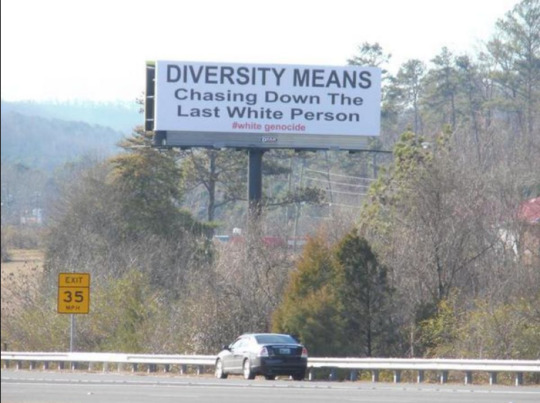


They think this is allowed now.
Sixty-three million people, complacently or enthusiastically or ignorantly aligned with white supremacy, gave them the idea it is.
It’s going to be our job to show them otherwise.
We must show them otherwise.
And.
Even if you voted for Trump—especially if you voted for Trump—the door is wide open for you to join in that struggle. You show them otherwise, too. All you have to do to join...is join.
Your intentions were good? Excellent. I believe you.
I've badly misunderstood you? Excellent. I believe you.
Now, show it. Show your good intention by your good actions.
You, like all of us, possess tremendous moral authority. Don't lend it any longer to those who have promised to squander it on atrocity. They seem intent on doing as they say. If you wait too long, they will leave you with none left to withdraw.
Use it to protect those different than you. Use it against your own advantage, for the advantage of those who have none.
And.
If you, like me, did not vote for Trump, there is the great danger of complicity. You will be offered, if you, like me are white and straight and employed and well-off and cis-gendered and able-bodied and healthy and property-owning, the opportunity to be indifferent. Resist that current.
If the universe bends toward justice, the engine it has chosen for this good work is the hard and sacrificial struggle of good people willing to acknowledge the basic humanity of all other people. People who don’t think profitability is the foundational metric of goodness. People who don't think life holds a value that begins at conception but ends the moment it enters poverty. People bold and willing to become peaceful pebbles in the gears. To give time and money. To link arms with a married gay couple. To take sides in a cafeteria skirmish with a transgendered teen. To take a truncheon in the head for a Muslim.
To paraphrase Jesus (another favorite who those of us in white Christian America appear by our words and deeds to consider as safely dead as Dr. King): to live, first you must die.
Or, as another poet says, love’s the only engine of survival.
So, what’s next?
First, we lament. We acknowledge the un-sky, the void. We listen to those who’ve been staring at it far longer than us. We name the challenge with clear eyes. That, I suppose, is what this has been.
And then we get to work.
Let us hope our leaders will prove other than than they say they will.
Let us not be so naive to think it likely.
Let us oppose in a fierce and broken love.
Let us meet with friends, we eat good meals with them.
Let us consider people before money, and notice where our society fails to do so.
Let us make art, and we try to make it well.
Let us refuse to allow a comfortable silence to enfold a hateful or ignorant statement.
Let us stand up against hate, bodily if necessary.
Let us learn our system, and work within it.
Let us call our leaders, and advocate for those who suffer.
Let us practice generosity without care for the merit of the beneficiary, but only for their need.
Let us investigate before we publish.
Let us loudly proclaim the humanity others try to diminish.
Let loudly proclaim the humanity of those who do not share our values, even as we oppose.
Let us never celebrate the suffering of those who oppose us, for they suffer, too.
Let us seek to divest ourselves of unearned cultural advantage.
Let us enter spaces where our voices are not primary, and listen without thinking to speak.
Let us create space to speak, in places where our voices are primary, for those who have had no voice.
Let us reject optimism and blind belief.
Let us embrace hope.
Let us work.
Let us work.
Let us work.
We are a people who have dreamed of the sky. I’d like to see if we can make it real.
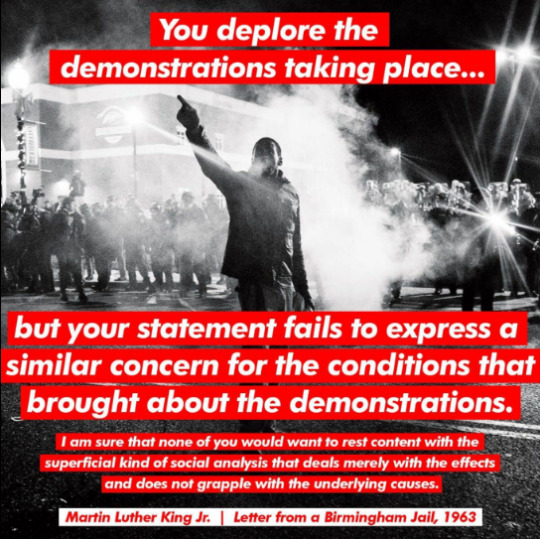

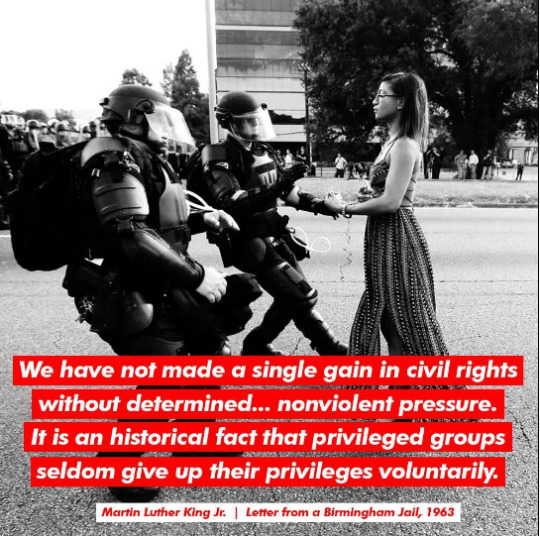
source: http://www.armoxon.com/2017/01/sky.html (January 16, 2017)
VOTE
26 notes
·
View notes
Text
In the last four years, Ioan Grillo traveled thousands of kilometers in crossings that took him from Mexico to the United States, Germany, Romania, Serbia, Bulgaria and Colombia, while following a trail of iron and blood.
Grillo asked an arms dealer in Bulgaria, “Are you worried that the weapons you sell, legally, may later fall into the hands of criminals or terrorists?" The man stared at him and said no.
The Mexican government recently filed a lawsuit against major U.S. arms manufacturers and distributors in federal court in Boston, arguing their negligent business practices have sparked bloodshed in Mexico by marketing to the country’s criminal underworld, “facilitating the unlawful trafficking of their guns to drug cartels.”
The complex world of arms trafficking and its intimate relationship with the rise of violence in countries like Mexico is the central theme of Grillo's book published earlier this year, "Blood Gun Money: How America Arms Gangs and Cartels." It's a comprehensive investigation that took Grillo around the world as he persecuted designers, manufacturers, distributors, traffickers and criminals united by a single product: weapons.
“The arms industry, like the drug industry, is fascinating because they move their products with the logic of globalized capitalism and the connections of their products. The big difference is that the weapons have serial numbers and can be traced,” said Grillo, an English writer and journalist who for more than 20 years has focused on the coverage and analysis of drug trafficking, violence and organized crime in Latin America.
According to a February report from the U.S. Government Accountability Office, the Department of Justice’s Bureau of Alcohol, Tobacco, Firearms and Explosives “found that 70 percent of firearms reported to have been recovered in Mexico from 2014 through 2018 and submitted for tracing were U.S. sourced.”
According to the Mexican government, at least 17,000 homicides in 2019 were linked to arms trafficking. Authorities estimate that more than 2.5 million guns have crossed the southern border of the United States in the last decade.
Grillo’s works were cited in the lawsuit filed by the Mexican authorities.
During his most recent investigation, he was able to reconstruct the history of an AK-47 rifle from the factory that made it in Romania, through its export to the United States, its sale and its subsequent entry into Mexico — where it was used to assassinate a law enforcement officer.
“Manufacturers go to great lengths to hide tracking data from the public, because they don’t want to link stores that sell guns to people’s deaths. They are ashamed,” Grillo said.
Noticias Telemundo asked Grillo about the recent lawsuit and his book's findings.
Noticias Telemundo: Many experts believe that Mexico's lawsuit is a symbolic gesture considering the gun manufacturers' legal shields in the U.S. Do you think it will have any practical consequences?
Ioan Grillo: The lawsuit in Mexico is a different and very interesting initiative because in the United States many changes in various industries, such as pharmaceuticals and tobacco companies, have begun in the courts. It is important because there are 11 very large companies that will have to bring their lawyers and undergo a judicial process.
In addition, there are precedents such as the lawsuit against Century Arms for the 2019 shooting in Gilroy, California, and the $33 million settlement reached by some families in the mass shooting at the Sandy Hook school with Remington. The fact that this is talked about in the news and that people comment on it is already a positive reaction.
The National Shooting Sports Foundation and the National Rifle Association responded to the lawsuit saying that the Mexican government is responsible for the criminal boom in the country. What are your thoughts on that?
Grillo: The United States does have a great responsibility in the trafficking of arms and the violence in Mexico. Although the Mexican Government must improve a lot, the influence of weapons that arrive through the border cannot be denied. Imagine if Russia sent 2 million firearms to Germany and that generated a wave of violence with 200,000 deaths — that would be inconceivable, right? Manufacturers have to take responsibility and see why their products are getting into the hands of the cartels.
It is not normal for someone to walk into a store and buy 85 firearms — someone in Florida to acquire a thousand guns for criminals which end up in Colombia or Puerto Rico and are used in murders. This shows that no basic attempt is made to slow down or reduce this traffic. And, in the end, companies are making a lot of money because there are millions of firearms.
In what year did your investigations detect the increase in the flow of weapons to Mexico?
Grillo: From 1994 to 2004 there was a ban that greatly reduced the sale of weapons of war. When they lifted it, huge purchases began to be registered and the war in Mexico began, before Felipe Calderón's presidency. Between 2004 and 2006, assault weapons became available as fights broke out between Los Zetas and the Sinaloa cartels. Then everything got worse.
What do the designers, manufacturers and arms dealers you interviewed for your book think of the violence unleashed by weapons?
Grillo: They often say that people have always used weapons and see them as tools that have a demand, and they satisfy it. As long as they comply with the laws in their countries, they do not see it as something strange. That is why governments must enact other measures to control this activity.
In many European countries, arms control have yielded good results.
Grillo: When the number of firearms in the streets is controlled, the number of deaths is reduced. In France, for example, after the terrorist attacks, restrictions were intensified, and that has decreased the attacks. In fact, many [of the attacks] are with knives, because the opportunities for terrorists and criminals to obtain firearms were shut down.
The explosion of mass shootings in the United States is one of the consequences of the absence of arms controls.
1 note
·
View note
Photo

JACOBIN MAGAZINE
If you go by most of what you see in the media, you would think politics is governed by some strange version of Newtonian physics. “Both sides” are perennially to blame, and if there’s ever dangerous excesses on one end of the political spectrum, then they must of course be evened out by the existence of equally dangerous excesses on the other end.
It’s why, after George Soros was mailed a bomb, Chuck Schumer felt the need to announce that “despicable acts of violence and harassment are being carried out by radicals across the political spectrum.” And why the New York Times, after more explosives were sent to individuals hated by the Trump-loving Right, decidedthe explosives were adding “to [a] climate of overheated partisan rancor.”
Yet we’re now at a moment when it’s indisputable that only one of these “sides” has actually become a vehicle for dangerous, violent extremism.
I’m speaking about the quickly fading line between the far Right and “mainstream” conservatism. This isn’t really a new phenomenon. The dividing line between US conservatism and fringe bigots of various kinds has always been pretty flimsy; the old, “respectable” conservatism represented by William F. Buckley and pined for by today’s centrist pundits was also a deeply racist one. It’s not a mystery why the Klan endorsed Ronald Reagan for president twice.
But just consider some of the events of the past few weeks. The “theory” that the bombs sent by Trump superfan Cesar Sayoc were a “false flag” orchestrated by the Left quickly moved from far right internet message boards to being broadcast by “mainstream” conservatives, including Rush Limbaugh, Ann Coulter, Lou Dobbs, Michael Savage, various Fox News guests, and even a Republican lawmaker, Matt Gaetz. Gaetz, along with “mainstream” conservatives like Newt Gingrich, also floated the idea that the thousands of Central American migrants traveling to Mexico and the US-Mexican border were being funded by some mysterious agent of chaos. One of these conservatives was pundit and prolific conspiracy theorist Erick Erickson, who for some reason was invited this past Sunday onto Meet the Press where he play-acted as a sober moderate and lectured conservatives to drop the crazy talk.
It called to mind the recent episode in which conservative legal thinker Ed Whelan invented an alternative“explanation” for Brett Kavanaugh’s alleged assault of Christine Blasey Ford that involved a Kavanaugh doppelgänger, defaming an innocent man in the process. It also calls to mind that, even now, a majority of Republicans believe Obama was born in Kenya.
This is far from the only recent instance of crossover between the far and “mainstream” Right. British far-right figure Stephen Yaxley-Lennon (a.k.a. “Tommy Robinson”) was invited by Republican congressman Paul Gosar to speak to the Conservative Opportunity Society, a group of right-wing House Republicans founded by Steve King. This is only a few months after Gosar traveled to London and spoke in support of Yaxley-Lennon at a protest peopled with other far-right figures, where he called Muslim men a “scourge.” The Arizona GOP said nothing.
Speaking of Steve King — the Republican congressman who, whoopsie daisy, just happens to somehow constantly retweet, meet with, and sound exactly like neo-Nazis — his “mainstream” colleagues seem to have a hard time condemning him. Here’s a parade of local GOP officials defending King and whitewashing his various racist comments (“he’s a godly, upright man”; “I think that he says what he means”;“maybe it’s crude, maybe a little mean, but it gets the point across”). One GOP county chair, when asked if King’s statement that “we can’t restore our civilization with somebody else’s babies” was racist, responded: “I think it’s a reality.” (The head of the Republican Congressional fundraising arm did finally criticize King on Tuesday.)
King has helpfully made clear an obvious truth that would be considered too “partisan” if uttered by anyone in the media. Referring to the Freedom Party of Austria, a far-right party of actual Nazis, King said: “If they were in America pushing the platform that they push, they would be Republicans.” And he’s not wrong: this November features a gaggle of real-life, no-kidding neo-Nazis and white supremacists running as GOP nominees.
Meanwhile, the Proud Boys, a ridiculous but nonetheless violent fascist gang led by Vice founder Gavin McInnes, have been welcomed into the Republican Party fold, with McInnes invited by the Metropolitan Republican Club of New York City — traditionally a hub for the GOP’s establishment elite — to give a lecture. The talk involved McInnes re-enacting the 1960 assassination of Japanese Socialist Party leader Inejiro Asanuma, complete with caricatured Asian eyes, and concluding, “Never let evil take root,” a line reportedly met with hooting and cheering by the Republican audience. The Proud Boys also acted as “security” for Joe Gibson, a far-right activist who was briefly a Republican Senate candidate from Washington, and a recent protest by the gang was organized by a local GOP official in Florida.
We can also see this shift in Fox News, the most popular and powerful media arm of the conservative movement. Fox has long been a bastion of racist dog-whistling, as Megyn Kelly’s tenure at the network can attest, but it’s recently opted to swap the dog whistle for a bullhorn. Tucker Carlson runs shows about the dangers of Roma immigration and supposed anti-white discrimination in South Africa, while Laura Ingraham told viewers that “massive demographic changes have been foisted upon the American people” through both illegal and legal immigration, and that “the America that we know and love doesn’t exist anymore” in parts of the country. Earlier this week, Fox & Friends co-host Brian Kilmeade suggested that the migrants headed toward the US are carrying unnamed “diseases,” which Toronto Star reporter Daniel Dale accurately called “a staple of racist and anti-semitic incitement for hundreds of years.”
But the fact that Fox has never been far from these more alarmingly explicit appeals to racism is key, because the same goes for “mainstream” conservatism. As the Left has been at pains to point out for the past three years, other than on trade and some aspects of foreign policy, there is very little real substantive difference between Trump and “mainstream” conservatives, which is why Republicans, including his fiercest“opponents”, vote almost exactly in line with Trump’s policy positions most of the time. It’s also why Trump’s approval ratings are sky-high among Republicans and why “mainstream” conservatives have walked back their previous disapproval of Trump and now declare they’re “thrilled” with him. As one pollster has said, the “Never-Trump” Republicans that tend to appear on TV and in op-ed pages don’t really exist in real life.
Take a look at the recent midterms, which have seen the entire GOP heavily stoking racism in advance of voting day. The Congressional Leadership Fund super PAC, affiliated with House speaker Paul Ryan and the GOP leadership, has been running some breathtakingly racist ads. But the GOP’s “moderate” elements have been flirting with extremism for a while now.
Hatred of refugees, which motivated the latest far-right terrorist attack, was stoked by the “mainstream” Right in 2015, when 31 governors (all but one of them Republican) refused to resettle any Syrian refugees in their states. Hapless “moderate” Jeb Bush suggested letting in only the Christian ones. The following year, Ted Cruz, then another “moderate” alternative to Donald Trump, ran a campaign ad that was essentially Willie Horton for immigrant communities.
The Conservative Political Action Conference (CPAC), the annual confluence of “mainstream” conservatism’s brightest lights, has for many years been a cesspool of far-right talking points, ideas, and figures. Figures like Pamela Geller and Frank Gaffney were fixtures for years (Gaffney, a conspiratorial, anti-Muslim hate-monger, was also an adviser to Ted Cruz in 2016, and other GOP hopefuls that year lined up to be associated with him). Geert Wilders, the far-right Dutch politician, turned up once at CPAC to a forty-second standing ovation. This was the same year Wilders had been invited to the Capitol by Jon Kyl, the extremely conservative Republican former congressman who was considered a “pragmatic” choice to fill John McCain’s seat in Arizona.
(Continue Reading)
51 notes
·
View notes
Text
Blog Assignment 1/28/22
Race, Reform, and Rebellion focused on the Reconstruction era in American history. The First Reconstruction took place after the Civil War (1865-1877) which had abolished slavery. Reconstruction followed the elimination of structures of oppression but eventually succumbed to racist ideologies. Marable uses the key term biracial democracy to describe the initial goals of the First Reconstruction. Biracial democracy is the idea that both Blacks and whites could participate equally in our democracy. During the First Reconstruction, even though African-Americans were technically free, whites were persistent in preventing black economic power. As a form of restitution and to promote biracial democracy, some African-Americans were given land rights, however, these properties were revoked after Lincoln’s assassination. Marable makes the case that the biggest failure of the First Reconstruction was the government ignoring the need for massive land redistribution. There were some successes, however, including some political participation, black-owned newspapers, the passing of the 13th, 14th, and 15th amendments, and the creation of the Freedmen's Bureau. In response to the First Reconstruction, white supremacists created terrorist groups such as the Ku Klux Klan (which is still around today) aimed at intimidating Black citizens. Comparisons can be drawn between the murdering of innocent Black citizens during this era to modern issues of police brutality. According to the police violence database, the Black community is three times more likely to be murdered by police than whites.
Ultimately, the courts turned against the Black population, declaring the Civil Rights Act unconstitutional, revoking voting rights, and enacting Jim Crow Laws promoting segregation. This put an end to the idea of a biracial democracy. The government’s failure to protect people of color is a recurring theme in America and progression seems to occur only when in the interest of white individuals. For example, the difference in treatment between protestors for the Black Lives Matter (BLM) movement and protesters in the insurrection was very telling. While BLM protests were mostly peaceful (even though the media said otherwise), Insurrectionists were violent and even killed a police officer. If the roles were reversed, black protesters would have been murdered if they attempted an insurrection. The differences in police use of force revealed a government that seems to care more for the protection of white citizens than Black citizens.
The second reading, Race, Place, and the Law, picks up right where the first paper left off, explaining the dynamics of the Jim Crow era and its economic, political, and social implications. Delaney uses the key term color line as a metaphor to describe how white supremacist ideologies infiltrated our legal system in the form of segregation. As Black lives were allocated to certain sections of society apart from whites, there was a clear distinction -a color line- between white life and Black life. The racial discrimination between these two worlds was very obvious and many viewed it as “two Americas.” Exclusion, inferiority, and humiliation were crucial aspects of Jim Crow. The thought of a biracial democracy was something of the distant past as African-Americans were often denied access to facilities and good jobs. In manipulating the geography of the U.S, political repercussions followed, and access to opportunities such as owning sufficient land and thus, power was diminished. These color lines stained the geography of America as many neighborhoods that were declared “Black” in the late 19th century are still considered Black neighborhoods today.
Aside from separating Black and white populations and disadvantaging Black citizens, a primary mechanism of racial discrimination was voter suppression tactics aimed at silencing Black citizens and limiting their political power. Unfortunately, voter suppression has persisted through current times. During the last presidential election, my mom went to Georgia to campaign door-to-door against Trump. While there, she was very disturbed to see that voter suppression practices in Black neighborhoods were very apparent. Ballot boxes were removed from Black communities and placed into storage. Further, a disproportionate number of ballots from people of color were denied, claiming the signature was invalid.
Time and time again, when Black lives are under attack, the government fails to protect them. Any time there is progression in the Black community, white supremacists respond with violent backlash and calls for suppression of their power. As the first reading states, this was apparent during the First Reconstruction with the creation of violent hate groups and this phenomenon persists in the Delaney reading with examples of race riots and public lynchings. Police officers were often present in support of these lynchings and they were regarded as ‘fun’ community events to attend. Lynchings were often in response to minor offenses such as crossing the color line. Clearly, the subordination of the Black community in our country is intentional and many political, social, and economic policies were implemented to keep people of color at the bottom. Whites have continuously suppressed their political power, their voices, their education, their housing and land ownership, their job opportunities, and ultimately their power. The racial disparities that exist today are in no way the fault of the Black community as segregationists and assimilationists from previous readings might suggest.
0 notes
Text
Twitter Resumption, COVID-19 Vaccines & Insecurity - Read President Buhari’s Independence Day Speech
Twitter Resumption, COVID-19 Vaccines & Insecurity - Read President Buhari’s Independence Day Speech President Muhammadu Buhari stated in his Independence Day speech that he has ordered that the restriction on Twitter services be lifted in Nigeria provided certain criteria are satisfied.He stated that the platform must guarantee that Nigerians utilize it for business and positive interactions. Criminal activity, the propagation of fake news, and the promotion of ethnic and religious sentiments will not be tolerated.Buhari assured Nigerians that the government will continue to prioritize and rebuild the economy following the country’s devastating recession, as well as restore peace in places where there are security issues. However, the Covid-19 pandemic and its impact on many countries have caused the government to shift gears and re-strategize. Nigerians are being urged not to take Covid-19 lightly.President Buhari also took use of the occasion to remind the international community that the present rate of access to the Covid-19 vaccination is unacceptable.Citizens of Nigeria. It is with full gratitude to God that today, we celebrate Nigeria’s sixty-first Independence Anniversary. For 1st of October 1960 to happen, all hands were on deck. East, West, North all came together to celebrate freedom. Today should not only serve as a reminder of the day the British handed over the reins of power to Nigerians, but also unified Nigerians from all ethnic groups, religions and regions. Today, despite the challenges we face, most Nigerians still maintain the spirit of 1st October. That positive outlook and determination to make Nigeria a peaceful and prosperous nation. It is due to this collective attitude that Nigeria doggedly continues to remain a united and indivisible nation. Fellow Nigerians, the past eighteen months have been some of the most difficult periods in the history of Nigeria. Since the civil war, I doubt whether we have seen a period of more heightened challenges than what we have witnessed in this period. Our original priorities for 2020 were to continue stabilising our economy following the deep recession while restoring peace in areas confronted with security challenges. But the COVID-19 pandemic and its devastating impact on all nations meant we needed to shift gears and re-strategise. Nigerians came together as one to fight against COVID-19. It is this attitude and by the special grace of God, we continue to survive the pandemic as a nation and indeed, provide leadership and example at regional and international levels. The doomsday scenario predicted for our country never came. Even as the Delta variant continues to spread, we have built the capacity we need to respond now and into the future. I will therefore appeal to Nigerians not to take COVID lightly, adhere to public health and social measures, put your mask on and get vaccinated. We can control this pandemic, but it requires effort on everybody’s part. The investments we made in response to COVID-19 will also serve our country to tackle any future disease outbreaks or pandemics. Despite the global inequity in access to vaccines, the Government of Nigeria has continued to explore all available options to ensure Nigerians have free access to safe and effective vaccines. Some five million vaccine doses have been administered to Nigerians through efforts led by the National Primary Health Care Development Agency and we will continue to explore options for purchase or acquisition of vaccines such as through COVAX and the African Vaccine Acquisition Trust. I will take this opportunity to remind the global community that the current state of access to COVID-19 vaccines is unacceptable. We cannot afford a situation where a handful of countries keep the global vaccine supply to themselves at the expense of other nations. We must act now to accelerate the equitable distribution of COVID-19 vaccines. This is the message I conveyed to the international community in New York last week. As we push to source vaccines for our immediate needs, we shall invest more to support our pharmaceutical and research agencies to come up with ideas for locally developed vaccines. Should another pandemic arise in the future, Our question is simple; will Nigeria be ready? Accordingly, I have directed the Ministries of Finance, Budget and National Planning, Health, Education and Science and Technology to work with Nigerian and International pharmaceutical companies and research organisations to enhance Nigeria’s domestic pharmaceutical capacity. Already, the Nigerian Sovereign Investment Authority is raising a $200 million fund for this initiative that will complement the Central Bank of Nigeria’s ongoing N85 billion Healthcare Sector Research and Development Intervention Scheme to support local researchers in the development of vaccines and drugs to combat communicable and non-communicable diseases, including COVID-19. Fellow Nigerians, this is just the beginning. Similarly, on our approach to food security, I am proud to announce Nigeria has commenced its journey to pharmaceutical independence. This journey, which will take years to achieve but will ultimately result in Nigerian based companies developing the Active Pharmaceutical substances and competence needed for us to make our own drugs and vaccines. Fellow Nigerians, As our economy continues to open after the COVID-19 related lockdowns, we have also seen the resurgence of insecurity in certain parts of the country. In the last four months, the gallant men and women of the Military and Security Agencies have made tremendous progress in addressing these new security challenges. We are taking the fight to our enemies from all angles and we are winning. Earlier this year, I launched the Integrated National Security and Waterways Protection Infrastructure, the Deep Blue Project, which is designed to secure Nigerian waters up to the Gulf of Guinea. I am happy to inform Nigerians that we have taken delivery of key assets for this project and very soon, its impact will be felt. In the North East region alone, over eight thousand Boko Haram terrorists have surrendered. To support our surge approach to fighting banditry, the Nigerian Armed Forces have recruited over 17,000 personnel across all ranks. Furthermore, I have also approved for the Nigerian Police Force to recruit 10,000 police officers annually over the next six years. I am also pleased to note that most of the Air Force platforms we acquired over the past three years have started to arrive in Nigeria. These will positively impact our security operations in all parts of the country. In line with section 14(2)(b) of the 1999 Constitution (as amended), the security and welfare of Nigerians continue to be the prime focus on which programmes and projects of our government revolve. Therefore, as a Government, we are ready to arrest and prosecute all persons inciting violence through words or action. Our resolve for a peaceful, united and one Nigeria remains resolute and unwavering. That said, our hope is not to fight for peace. We can always settle our grievances peacefully without spilling any blood. I will therefore take this opportunity, on this special day that symbolises the unity and oneness of our great nation, to ask all Nigerians to embrace peace and dialogue, whatever your grievances. The seeds of violence are planted in people’s heads through words. Reckless utterances of a few have led to losses of many innocent lives and the destruction of properties. Such unfiltered and unsubstantiated lies and hate speeches by a few evil persons must be stopped. Our media houses and commentators must move away from just reporting irresponsible remarks to investigating the truth behind all statements and presenting the facts to readers. We must all come out and speak against the lies being peddled. At this point, I would want to sincerely appreciate the large number of our Traditional, Religious and Community leaders as well as other well-meaning Nigerians who, in their various fora are openly spreading the message of peaceful co-existence and conflict settlement through dialogue in their respective communities. Nigeria is for all of us. Its unity is not negotiable. And its ultimate success can only be achieved if we all come together with a common goal of having peace and prosperity for our nation. We shall continue to work on dialogue-based solutions to address legitimate grievances. But we remain ready to take decisive actions against secessionist agitators and their sponsors who threaten our national security. The recent arrests of Nnamdi Kanu and Sunday Adeyemo, and the ongoing investigations being conducted have revealed certain high-profile financiers behind these individuals. We are vigorously pursuing these financiers including one identified as a serving member of the national assembly. Fellow Nigerians, This is a clear example of how people abandon their national leadership positions for their selfish gains. Instead of preaching unity, they are funding and misleading our youth to conduct criminal acts that sometimes lead to unfortunate and unnecessary loss of lives and property. As the so-called leaders run abroad to hide, our innocent youths are misled and left in the streets to fight for their senseless and destructive causes. Government will continue, with greater level of peoples’ participation and in collaboration with our international partners, to improve the security architecture, reduce enabling environment for criminality to thrive and eliminate opportunities for terrorism financing. Fellow Nigerians, our unrelenting effort at resolving an almost two-decade stalling on the management of our Petroleum resources and ensuring equitable consideration to our host communities has resulted in the enactment of the Petroleum Industry Act, 2021. This Act not only overhauls the Institutional, regulatory and fiscal framework of the Petroleum Industry but also reduces the previous opacity associated with this sector. This is the first step to the reforms as the process is a continuous one. Already, to further improve the governance framework, I have sought for an amendment of sections 11(2)(b) and 34(2)(b). We will also continue to review and amend as appropriate. At this juncture, it is very appropriate that I salute the leadership and members of the Ninth Assembly for their patriotism, dedication to duty, candour and most importantly the dispatch with which they have enacted legacy legislations for this nation. I do not take such level of cooperation for granted and hope it continues for the overall efficiency of the Federal machinery. Nigeria’s Roadmap on Local Refining is on track with the Commissioning of a Modular refinery in Imo State. A second is scheduled for commissioning by the end of this year in Edo State and the third one in Bayelsa State by 2022. In addition to the modular projects, we also have the two mega refinery projects coming up in Lagos and Akwa Ibom States. As these refineries are commissioned, more employment opportunities are created and there would be increased petroleum products available for local consumption which will significantly reduce our reliance on importation. In further demonstrating our plan to reduce our dependence on oil and tapping from our enormous gas resources, this administration remains committed to the “Decade of Gas” Initiative, which is aimed at bringing to focus the utilization of our huge gas resources. Already, we are supporting and promoting various gas-based projects including NLNG Train 7 and the mega urea and ammonia projects in the South-South region. As we continue to optimise and enhance our oil and gas sector, I am also proud and delighted to state that our economic diversification strategy remains on course with the persistent increase in Non-Oil Sector contribution to GDP. We recovered from economic recession in quarter four of 2020 with a GDP growth rate of 0.11%, and grew by 0.51% and 5.01% in real terms in the first and second quarters of 2021. The Agricultural sector remains key to our economic diversification efforts as the sector has been a consistent driver of the non-oil sector contributing 22.35% and 23.78% to the overall GDP in the first and second quarter of 2021. We have seen significant private sector investments in almost all areas of the agricultural value chain. And these have continued even during the COVID-19 pandemic. Unfortunately, as our food production capacity has increased, food prices have been going up due to artificial shortages created by middlemen who have been buying and hoarding these essential commodities for profiteering. To address this, I am hereby directing the Ministry of Agriculture and Rural Development to rehabilitate the National Food Reserve Agency and also work with security agencies, the Nigerian Commodity Exchange, and the National Assembly to find a lasting solution to these disruptive and unpatriotic hoarding activities. To further enhance food production, we have completed several new dams and are in the process of rehabilitating several River Basin Development Authorities to enhance groundwater supply for rainfed agriculture as well as surface water for irrigation agriculture. The water projects we completed between 2015 to 2020 have improved Nigerian’s access to potable water to 71% between 2015 and 2020. This means 12.5 million additional Nigerians now have direct access to potable water. Fellow Nigerians, This Government remains concerned by the significant transportation infrastructure deficit we have. Addressing the challenges our commuters and lorry drivers face on the motorways is still a high priority to us. To complement our budgetary allocations, the Presidential Infrastructure Development Fund and the Road Infrastructure Development and Refurbishment Investment Tax Credit Scheme, we recently established an N15trillion Infrastructural Corporation of Nigeria Limited (INFRACO), which is expected to begin operation by the fourth quarter of this year. INFRACO will also focus on leveraging resources on a public-private sector basis for infrastructural development in Nigeria. We hope through these innovative programs, the additional cost burden on individuals and businesses because of inefficient logistics operations will be reduced and ultimately, eliminated. We currently have over 13,000 kilometres of roads and bridges under construction all over the country of which a fair percentage have been completed. As we fix our roads, we also continue to extend and upgrade Nigeria’s railway network with the notable opening of the Warri- Itakpe standard gauge rail line. To increase capacity, we have introduced more locomotives, coaches and wagons including the establishment of a Wagon Assembly in Kajola, Ogun State. The seaports however still remain problematic. The effect of our various interventions to reduce the gridlocks and inefficiencies have been slower than expected. However, the implementation of the Electronic Call-Up System, as well as the conversion of the Lillypond Container Terminal to a Vehicle Transit Area, will further enhance the ease of cargo evacuation. Our prioritisation of developing Nigeria’s Digital Economy has positively impacted the contribution of the ICT sector to our GDP. We hope our present efforts to ensure all Nigerians use a National Identification Number, as well as our planned roll-out of the fifth-generation (5G) network technology, will ensure we stay in line with the global innovation curve as a Nation. As we embrace the digital economy in Nigeria, we are fully aware of the prospects and the perils. Our policies have been developed to enable Nigerians to take advantage of the prospects and avoid the perils of digital technologies. Social media is a very useful platform that has enabled millions of Nigerians to connect with loved ones, promote their businesses, socialise, and access news and other information. However, recent events have shown that the platform is not just an innocuous platform for information dissemination. Rather some users have misused the platform to organise, coordinate, and execute criminal activities, propagate fake news, and promote ethnic and religious sentiments. To address these negative trends, the Federal Government of Nigeria suspended the operations of Twitter in Nigeria on June 5, 2021 to allow the Government put measures in place to address these challenges. Following the suspension of Twitter operations, Twitter Inc. reached out to the Federal Government of Nigeria to resolve the impasse. Subsequently, I constituted a Presidential Committee to engage Twitter to explore the possibility of resolving the issue. The Committee, along with its Technical Team, has engaged with Twitter and have addressed a number of key issues. These are:a. National Security and Cohesion;b. Registration, Physical presence and Representation;c. Fair Taxation;d. Dispute Resolution; ande. Local Content. Following the extensive engagements, the issues are being addressed and I have directed that the suspension be lifted but only if the conditions are met to allow our citizens to continue the use of the platform for business and positive engagements. As a country, we are committed to ensuring that digital companies use their platform to enhance the lives of our citizens, respect Nigeria’s sovereignty, cultural values and promote online safety. Nigeria’s progressive diplomacy continues to manifest through growing numbers of highly placed Nigerians in positions of regional and global influence. Very recently, Nigeria won the election for the position of Commissioner for the expanded Political, Peace and Security Affairs of the African Union. Our persistent calls for a reorganized and reformed ECOWAS, to make the organization citizens-sensitive, paid off with the acceptance by the Authority of Heads of State and Governments of ECOWAS to commence the agreed reforms in the organization ahead of the next elections of the organization’s principal officers in December this year. At the African Development Bank, World Trade Organization and indeed, the United Nations, footprints of Nigeria’s Diplomacy are clearly evident. We remain confident that our goal of lifting 100million Nigerians out of poverty in 10 years is achievable. Considering the positive impact of our Social Investment Programs, I recently approved an increase in the number of N-Power program beneficiaries from 500,000 to 1,000,000. Out of this, 510,000 have started the programme while the competitive selection process for onboarding the outstanding 490,000 beneficiaries is in progress. The National Home-Grown School Feeding Programme is currently being implemented in 35 States of the Federation and the FCT. Over 103,000 women have been engaged and empowered as cooks under the programme, while about 10 million pupils are being fed across public primary schools in the country. To grant increased access to credit to the most poor and vulnerable, I have directed an increase in the disbursement of Government Enterprise and Empowerment Programme loans to an additional one million beneficiaries laying more emphasis on the smallholding farmers through the farmers Moni program. Fellow Nigerians, For far too long we have neglected the centrality of the civil service as the engine of governance and this has manifested in ineffective service delivery. There is widespread discontent and disillusion about the efficiency and probity of our civil service. It is for this reason that we are refocusing the Nigerian Civil Service to provide World-class service to run our country. The youths of this great country remain propellants for our today and provide guarantees that we would have a secure tomorrow. It is for this reason that I remain focused on expanding opportunities for their participation in politics and governance. Recent appointments of young people into positions of authority and their track record so far, gives me confidence that we need to bring more of them into governance and this I promise to do. More specifically, to encourage Girl-Child Education, female scholarship schemes, life skills and digital literacy skills to boost girl’s enrolment, retention and completion of schooling, are all initiatives put in place to ensure gender balance in appropriately positioning our youths for positions of leadership. The commitment of this Administration to the well-being of people living with disabilities remains unwavering. Government recognises their contributions to development and I have, in this regard, directed that all relevant Government Agencies pay special attention to the peculiarities of different abilities in the implementation of policies and programmes. Rape and Gender-Based Violence remains a sore point in our Nation as in many countries worldwide and this was worsened during and after the outbreak of the COVID-19 pandemic. We are currently engaging Heads of Courts to establish Specialised Courts for the speedy and seamless trial of Rape/Gender-Based offences especially to ensure that justice is done for child victims of sexual violence. On the other hand, work has advanced in the reformation, reintegration and reunification of Minors involved in one crime or the other. The reformation in our Correctional Services has manifested in an increase in modernised custodial centres and a transformation from strictly punitive to attitudinal changes so that criminals do not relapse into their previous lifestyle. As we begin to celebrate our sixty one years as a Nation, we need to be conscious that Nigeria does not start and end with the Federal Government. This country is a great collective where Government at all arms and levels as well as the private sector, and more importantly individuals, have a role to play. In particular, security is a bottom to top undertaking. Joining hands and hearts together would enable us to secure ourselves and our country. I fully understand the anxiety of many Nigerians on the inability of this country to go beyond a never-ending potential for becoming a great nation to an actually great one. A lot has been achieved in the last six years on many fronts: in infrastructure, social care, governance, Nigeria’s image and influence in Africa and the international community. But critics misdiagnose incremental progress as stagnation. Since coming to power, this Administration has tackled our problems head-on in spite of the meagre resources. No government since 1999 has done what we have done in six years to put Nigeria back on track. We shall continue to serve the country: listen to all and protect our democracy and country. Thank you all and God bless the Federal Republic of Nigeria. https://infohubs.com.ng/twitter-resumption-covid-19-vaccines-insecurity-read-president-buharis-independence-day-speech/
0 notes
Text
Which 4 Republicans Voted Yes Today
New Post has been published on https://www.patriotsnet.com/which-4-republicans-voted-yes-today/
Which 4 Republicans Voted Yes Today
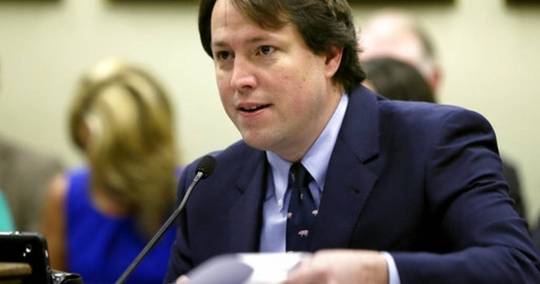
I Do Solemnly Swear That I Will Support And Defend The Constitution Of The United States Against All Enemies Foreign And Domestic; That I Will Bear True Faith And Allegiance To The Same; That I Take This Obligation Freely Without Any Mental Reservation Or Purpose Of Evasion; And That I Will Well And Faithfully Discharge The Duties Of The Office On Which I Am About To Enter So Help Me God
Mortality.
It’s something that you don’t really consider when you’re young. You can do anything. You’re invincible.
But as we grow older, we start considering that mortality.
It’s time we start considering the mortality of America.
I spend a substantial amount of time working in two different arenas – the world of law enforcement and the business world.
That travel that I referenced – both in the business world and supporting the LE world – has afforded me countless opportunities to work side by side with some of the greatest patriots in America.
My closest friends are either in law enforcement or either active or retired members of some of the most elite military forces in America. And from our greatest warriors to our everyday citizens… I can tell you the underlying fear that so many are thinking about – and that’s the seemingly inevitable collapse of society if we don’t make some monumental changes.
As a Christian, I believe we are in the middle of some serious spiritual warfare. But you don’t have to be a Christian to understand that the very soul of America is under attack right now. And the rapid erosion of the Thin Blue Line has us sitting on a powder keg.
Historically, if you look at the collapse of some of the greatest empires in the world, it happened from within. Simply put, it raises the distinct danger that America won’t be conquered by foreign enemies … but rather from domestic ones.
Economic issues
Environmental issues
Political issues
Mcconnell Among 19 Republicans To Vote For Infrastructure Bill Here Are The Republicans Who Helped It Over The Finish Line
A group of 19 Senate Republicans, led by Senate Minority Leader Mitch McConnell, joined the entire Democratic caucus in passing a $1.2 trillion infrastructure package on Tuesday.
The bill passed with a vote of 69-30, more than two weeks after President Joe Biden declared “we have a deal” with a bipartisan group of negotiators.
But the final bill included some noteworthy dissent.
Republican Sens. Jerry Moran of Kansas and Todd Young of Indiana were part of the bipartisan coalition backing the deal in July, but both voted against the bill on Tuesday, citing concerns about the national debt and Democrats’ plan to take up a $3.5 trillion budget reconciliation package after the infrastructure vote.
Sen. Mike Rounds, R-S.D., was not present for the vote but said he would not support the bill even though he also was part of the initial bipartisan group.
What’s in the infrastructure bill? Roads, broadband and bridges: Here’s what’s in the infrastructure agreement
In the split Senate, the bill still drew support from enough Republicans to pass the chamber, even as they faced pressure from former President Donald Trump to not give Biden a legislative win.
Biden said after the vote on Tuesday that he called most of the 19 Republican senators who voted for the infrastructure bill to praise them.
Here is how the Senate’s 50 Republicans voted:
The Tree Of Liberty Must Be Refreshed From Time To Time With The Blood Of Patriots And Tyrants It Is Its Natural Manure
We are seeing groups here in America demanding open borders. Demanding the decriminalization of crossing into our country illegally.
At the same time, across our great country, we are seeing the CRIMINALIZATION of law enforcement. It’s gotten so bad in states like the People’s Republic of California and Connecticut that we’re seeing the crash and burn of morale in law enforcement.
We’re seeing agencies desperate for officers, because as more and more retire , we see a deficit in the number of incoming recruits. After all, why would you want to live a life of service when you’re just going to be attacked for that service?
We see political activists masquerading as police chiefs. We see them working hand in hand with liberal politicians to not only attack the rights of law-abiding citizens, but also to destroy the morale of their own departments. We watch as they flat out disrespect the oath of office they took and put officers in no-win situations.
If I were to design a road map for how to collapse America, starting with law enforcement, here’s what it would look like.
Capitol Police Chief Apologizes For Security Failures During The Assault Including A Delay In Calling For Guard Troops
The acting chief of the Capitol Police apologized to Congress on Tuesday for the agency’s extensive security failures on Jan. 6, acknowledging during a closed-door briefing that the department knew there was a “strong potential for violence” but failed to take adequate steps to prevent what she described as a “terrorist attack.”
Yogananda D. Pittman, the acting chief of police, also confirmed that the Capitol Police Board, an obscure panel made up of three voting members, had initially declined a request two days earlier for National Guard troops and then delayed for more than an hour as the violence unfolded on Jan. 6 before finally agreeing to a plea from the Capitol Police for National Guard troops, according to prepared testimony obtained by The New York Times.
In an extraordinary admission, Chief Pittman, who was not the acting chief at the time of the siege, told members of the House Appropriations Committee, which oversees funding for the agency, that the Capitol Police “failed to meet its own high standards as well as yours.” She added, “I am here to offer my sincerest apologies on behalf of the department.” Chief Pittman’s predecessor, Steven Sund, resigned after the riot.
Chief Pittman’s comments offered the fullest detailed account to date about police preparations for Jan. 6, when thousands of angry protesters, believing false claims that the election had been stolen, marched on the Capitol at the behest of former President Donald J. Trump.
List Of 17 Cowardly Republicans Who Voted To Break Filibuster And Allow Massive Infrastructure Bill To Come To Floor


2.2Kshares
The so-called “infrastructure” bill is expected to be around $1.2 trillion over eight years with roughly $550 billion in new spending, but details on key components were still being worked out. Some procedural steps still lie ahead before the final passage.
CNN correspondent Manu Raju tweeted about the 17 cowardly Republicans who voted this afternoon to advance Biden’s climate change infrastructure bill to the Senate floor:
67-32, 17 Senate Republicans voted to break a filibuster and proceeed to the bipartisan infrastructure plan. All Democrats voted yes. Measure expected to be on the floor for at least a week and bipartisan coalition will have to deal with amendment process
— Manu Raju July 28, 2021
“Clearing the Fog” clarified why this bill is not a done deal:
Just to be clear, the infrastructure bill has not been passed. 17Republicans agreed to break the filibuster, and allow it to come to the floor. It isn’t nearly over.
Just to be clear, the infrastructure bill has not been passed.
17 Republicans agreed to break the filibuster, and allow it to come to the floor.
It isn’t nearly over. https://t.co/7LcB7mw17d
— ClearingTheFog July 28, 2021
Save up to 66% on MyPillow products. Use promo code FedUp, and save up to 66%.
Conservative Fox News host Laura Ingraham also tweeted about the vote by the feckless Republicans who continue to sell the future of our children down the river:
Thom Tillis
Todd Young
2.2Kshares
Despite Partisan Rhetoric At The Colorado Capitol Just 44% Of Bills This Year Passed Along Purely Party Lines
The analysis, the second such study conducted by The Colorado Sun in three years, once again indicates more bipartisanship in the Colorado General Assembly than might be expected
Sandra FishJesse Paul
Credibility:
This article contains new, firsthand information uncovered by its reporter. This includes directly interviewing sources and research / analysis of primary source documents.×closeOriginal Reporting
As a news piece, this article cites verifiable, third-party sources which have all been thoroughly fact-checked and deemed credible by the Newsroom.×closeSources Cited
This Newsmaker has been deemed by this Newsroom as having a specialized knowledge of the subject covered in this article.×closeSubject Specialist
A record 504 bills introduced in the Colorado legislature became law this year, and 94% of them had at least one Republican vote.
And half of the 39 Republicans in the state House and Senate voted for 58% of those bills, according to a Colorado Sun analysis.
That’s despite a third year of Democratic rule at the Colorado Capitol and GOP complaints that the majority party and Democratic Gov. Jared Polis are enacting policies that are too liberal and unfair to businesses and taxpayers.
The Sun analyzed final third-reading votes on the 504 bills that became law, omitting the four bills vetoed by Polis and the 114 measures that died in committees or never received a final vote on one of the chamber floors.
Janet Yellen The First Woman To Be Treasury Secretary Is Sworn In By The First Woman To Be Vice President
Janet L. Yellen was sworn in as the secretary of the Treasury Department on Tuesday by Vice President Kamala Harris, a history-making moment as both are the first women to hold two of the most powerful jobs in the United States government.
Ms. Yellen is the nation’s 78th Treasury secretary and the first woman to head the institution in its 232-year history. She is also the first woman to have held all three top economic jobs in the government, having served as chair of the Federal Reserve and the Council of Economic Advisers.
She is taking the job at a time of economic crisis, with millions still out of work and the recovery slowing as the coronavirus persists. Ms. Yellen will quickly be thrust into fraught negotiations over how to design and pass a robust stimulus package to help revive an economy that has been hammered by the pandemic.
Standing outside the White House, Ms. Yellen took the oath of office with her husband, the economist George Akerlof, and her son by her side. At the conclusion of the ceremony, Ms. Harris said, “Congratulations, Madam Secretary,” to which Ms. Yellen replied, “Thank you, Madam Vice President.”
Ms. Yellen said on Twitter that she was proud to be joining the Treasury Department and described the field of economics, and the agency’s mission, as one that can “right past wrongs and improve people’s lives.”
transcript
Senate Republicans Block Landmark Voting Rights Bill In Significant Setback For Democrats As It Happened
All 50 Republicans voted against advancing the legislation
Manchin tells Chuck Schumer he will vote to advance legislation
Senate Democrats to fall short of 60 votes needed to begin debate
New Yorkers vote in Democratic primary for New York mayoral pick
Wed 23 Jun 2021 01.27 BST First published on Tue 22 Jun 2021 13.58 BST
01:03
Capitol Riot Investigation Will Slow As Officials Work To Build More Complicated Cases Justice Dept Says
Justice Department officials said on Tuesday that the fast-moving federal investigation into the assault on the Capitol is expected to slow as investigators turn their attention to more complex matters such as conspiracy and sedition cases, the investigation into the death of Officer Brian D. Sicknick of the Capitol Police and violent attacks on members of the press.
In the 20 days since rioters stormed the Capitol, the F.B.I. has received over 200,000 digital media tips and identified more than 400 suspects. Federal prosecutors quickly charged 150 criminal cases, many of which have now been elevated to felonies.
But the manhunt and investigation is expected to “reach a period of a plateau,” said Michael R. Sherwin, the U.S. attorney in Washington, as investigators shift from identifying and rounding up individuals to putting together more complicated conspiracy cases related to possible coordination among militia groups and individuals from different states who had planned to travel to the Capitol and engage in criminal conduct before the attack.
“We have to have the proper evidence to charge these, and we’re going to get it,” said Steven M. D’Antuono, the F.B.I. assistant deputy in charge of the Washington field office. “All these cases are not based upon social media and Twitter and Instagram posts. We also have traditional law enforcement tools we need to use — grand jury subpoenas search warrants — and you don’t get that overnight.”
Republicans Defy Kevin Mccarthy And Gop Leadership To Vote With All Democrats In Favor Of Forming A 9/11
The House passed a bill that would create a commission to investigate the January 6 MAGA riot, with a vote of 252-175
Thirty-five Republicans defected from leadership and voted in favor of the bill that would create a bipartisan commission with subpoena power
House Minority Leader Kevin McCarthy came out against the bill Tuesday, followed by Senate Minority Leader Mitch McConnell on Wednesday
‘I beg you to pass this bill,’ said Republican Rep. John Katko, who had negotiated with Democrats to get the bill finished
Katko received applause on the House floor for saying the legislation was dedicated to members of the Capitol Police and their families
Earlier, an un-official letter from some members of the Capitol Police circulated shaming Republicans for not wanting to investigate January 6
Senator Patrick Leahy 80 Is Briefly Hospitalized As A Precaution After He Reported Feeling Unwell
Senator Patrick J. Leahy of Vermont, the longest-serving senator and the president pro tempore, was briefly taken to a hospital in Washington for observation early Tuesday evening after he reported not feeling well, his spokesman said. He returned home a few hours later after an evaluation.
Mr. Leahy, whose position in the Senate puts him third in line for the presidency, oversaw the start of the impeachment proceedings against former President Donald J. Trump earlier on Tuesday. At 80, Mr. Leahy is one of the oldest senators and has served in the Senate since 1975.
After he reported not feeling well in his office, Mr. Leahy “was examined in the Capitol by the attending physician,” said David Carle, the spokesman. “Out of an abundance of caution, the attending physician recommended that he be taken to a local hospital for observation, where he is now, and where he is being evaluated.”
Mr. Leahy was taken to George Washington University Hospital, where he received tests and “a thorough examination” before being released, Mr. Carle said.
The senator “looks forward to getting back to work,” Mr. Carle said.
Mr. Leahy has received both vaccine shots for the coronavirus, and it was unclear what his symptoms were.
Senator Charles E. Grassley, Republican of Iowa and Mr. Leahy’s predecessor as president pro tempore, was among those who wished Mr. Leahy well in a tweet Tuesday evening.
Here Are The 17 Republican Senators Who Voted To Advance The $1 Trillion Infrastructure Bill
Washington When the Senate voted Wednesday to open debate on a roughly $1 trillion infrastructure package, more than a dozen Republicans sided with Democrats to advance the legislation.
proposal,
Roy Blunt of Missouri
Richard Burr of North Carolina
Shelley Moore Capito of West Virginia
Bill Cassidy of Louisiana
Kevin Cramer of North Dakota
Mike Crapo of Idaho
Lindsey Graham of South Carolina
Chuck Grassley of Iowa
John Hoeven of North Dakota
Mitch McConnell of Kentucky
Thom Tillis of North Carolina
Todd Young of Indiana
Biden Calls Putin To Discuss Navalny Government Hack Ukraine And Malign Actions By Russia

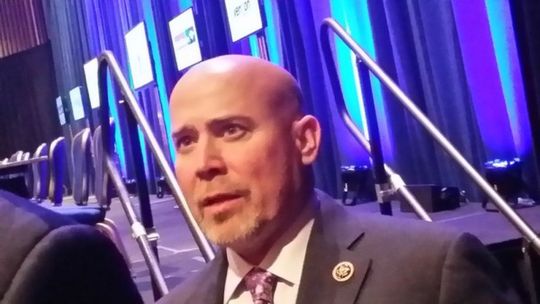
President Biden called President Vladimir V. Putin of Russia on Tuesday to address a long list of grievances — from the hacking of U.S. federal agencies, to the poisoning and detention of the Russian dissident Aleksei A. Navalny as well as a host of other “malign actions by Russia,” Jen Psaki, the White House press secretary, said.
Mr. Biden struck a more confrontational tone — a sharp break from former President Donald J. Trump’s chummy approach to Mr. Putin — committing to the protection of Ukraine’s “sovereignty,” and pressing for the extension of the New Start treaty for five years, which would limit both countries to 1,550 deployed strategic nuclear weapons.
“President Biden made clear that the United States will act firmly in defense of its national interests in response to actions by Russia that harm us or our allies,” according to a White House readout of the conversation. “The two presidents agreed to maintain transparent and consistent communication going forward.”
When Mr. Biden was asked at an event at the White House on Tuesday what Mr. Putin had to say, the president joked, “He sends his best!”
Mr. Biden attacked Mr. Trump and Mr. Putin with abandon during the 2020 campaign. But although he was able to mock Mr. Trump’s relationship with the Russian leader when he was a candidate, as president he must keep the peace between uneasy nuclear rivals.
But he quickly pivoted to the need for cooperation in “mutual self-interest,” and the treaty.
transcript
Lloyd Austin The New Defense Secretary Prepares To Address Sexual Assault In The Military
After years of failure to curb the scourge of sexual assault in the military, Lloyd J. Austin III, the new secretary of defense, is open to to how those crimes are prosecuted, a potential sea change that generations of commanders have resisted.
Overhauling the way the military handles sexual assault cases — by taking them outside the chain of command and assigning them to prosecutors with no connection to the accused — would need approval by Congress, where some legislators have long pushed for such a system.
President Biden has been a vocal proponent of these changes, even as general after general has gone to Capitol Hill to argue against them over the past decade. “I had a real run-in with one of the members of the Joint Chiefs in the cabinet room on the issue,” Mr. Biden said last year at a fund-raiser.
Mr. Austin’s first act as secretary was to order a review of how the Pentagon has been handling sexual assault cases. He is also being pushed by Congress. Senators repeatedly asked him how he planned to handle the problems of sexual harassment and assault in the military during his confirmation hearing this month.
If Mr. Austin, a retired four-star army general, were to embrace these changes, he would be the first secretary to do so, a major shift in position for the Pentagon.
The Capitol Attack Wasnt A False Flag Gop Officials Continue To Spread The Theory Anyway
In the hours after supporters of President Donald J. Trump engaged in a violent assault on the U.S. Capitol, some Republicans began advancing a fantastical alternative theory: that the attack was actually led by far-left activists trying to frame Republicans.
The outlandish claims have been widely discredited by the authorities, and some of the faces in the Capitol crowd were recognizable right-wing figures. The numerous arrests since the assault have overwhelmingly involved devoted Trump supporters and far-right adherents. But despite the clear evidence, the so-called false flag theory continues to persist in Republican circles.
Last week, the Oregon Republican Party passed a resolution falsely claiming that there was “growing evidence that the violence at the Capitol was a ‘false flag’ operation designed to discredit President Trump, his supporters and all conservative Republicans.” Bill Currier, the chairman of the Oregon Republican Party, said in a video discussion that state party officials were working with counterparts across the country to “coordinate our messaging” around the Capitol attack, the response to it and the continuing efforts to impeach the president.
Mr. Currier said other states would be adopting similar resolutions. “There will be many states doing this,” Mr. Currier said. “We’re not the only ones.”
Gop Leader Mccarthy: Trump ‘bears Responsibility’ For Violence Won’t Vote To Impeach
Some ambitious Republican senators have never been as on board the Trump train as the more feverish GOP members in the House, and the former might be open to convicting Trump. But their ambition cuts two ways — on the one hand, voting to ban Trump opens a lane to carry the Republican mantle in 2024 and be the party’s new standard-bearer, but, on the other, it has the potential to alienate many of the 74 million who voted for Trump, and whose votes they need.
It’s a long shot that Trump would ultimately be convicted, because 17 Republicans would need to join Democrats to get the two-thirds majority needed for a conviction. But it’s growing clearer that a majority of the Senate will vote to convict him, reflecting the number of Americans who are in favor of impeachment, disapproved of the job Trump has done and voted for his opponent in the 2020 presidential election.
Correction Jan. 14, 2021
A previous version of this story incorrectly said Rep. Peter Meijer is a West Point graduate. Meijer attended West Point, but he is a graduate of Columbia University.
Party Leaders Including Mcconnell And Trump Had Urged Colleagues To Reject Proposal
WASHINGTON—Senate Republicans blocked the creation of a bipartisan, independent commission to investigate the Jan. 6 assault on the U.S. Capitol by a pro-Trump mob, after GOP leaders urged colleagues to reject it.
The bill needed 60 votes to advance in the evenly divided Senate, thanks to the chamber’s longstanding filibuster rule. That means 10 Republicans would have had to vote with all 50 members of the Democratic caucus to allow the bill to proceed. Only six did, and the legislation fell short, with 54 votes in favor, 35 against and 11 senators not voting.
The six Republicans who voted in favor of proceeding with the legislation were Sens. Bill Cassidy of Louisiana, Susan Collins of Maine, Lisa Murkowski of Alaska, Rob Portman of Ohio, Mitt Romney of Utah and Ben Sasse of Nebraska. All but Mr. Portman had voted to convict former President Donald Trump in February at his impeachment trial on charges of inciting insurrection on Jan. 6. Mr. Trump was acquitted.
Two Democrats weren’t present for the vote: Sens. Patty Murray of Washington state and Kyrsten Sinema of Arizona. Nine Republicans also didn’t vote, including Sens. Pat Toomey of Pennsylvania and Richard Burr of North Carolina, both of whom were among the seven GOP senators who voted to convict Mr. Trump earlier this year.
House Votes To Impeach Trump But Senate Trial Unlikely Before Biden’s Inauguration
9. Rep. John Katko, New York’s 24th: Katko is a moderate from an evenly divided moderate district. A former federal prosecutor, he said of Trump: “It cannot be ignored that President Trump encouraged this insurrection.” He also noted that as the riot was happening, Trump “refused to call it off, putting countless lives in danger.”
10. Rep. David Valadao, California’s 21st: The Southern California congressman represents a majority-Latino district Biden won 54% to 44%. Valadao won election to this seat in 2012 before losing it in 2018 and winning it back in the fall. He’s the rare case of a member of Congress who touts his willingness to work with the other party. Of his vote for impeachment, he said: “President Trump was, without question, a driving force in the catastrophic events that took place on January 6.” He added, “His inciting rhetoric was un-American, abhorrent, and absolutely an impeachable offense.”
The White House Press Briefings Will Include An American Sign Language Interpreter
The Biden administration announced this week that it would include an American Sign Language interpreter in its daily press briefings, a step that the previous administration avoided taking until a court ordered it to do so late last year.
The move is a “historical first,” according to Howard A. Rosenblum, the chief executive officer of the National Association of the Deaf.
Past administrations have occasionally had A.S.L. briefers at some White House events and meetings, Mr. Rosenblum said, but President Biden is the first to make it a fixture.
“The president is committed to building an America that is more inclusive, more just and more accessible for every American, including Americans with disabilities and their families,” Jen Psaki, the White House press secretary, said during Monday’s briefing. She introduced the interpreter as Heather.
Last year, Mr. Rosenblum’s advocacy group and five deaf Americans sued the Trump administration for holding briefings on the coronavirus without a sign language interpreter present, arguing that it was a violation of the First Amendment.
The government responded that it had provided closed-captioning, but the plaintiffs said that was not an adequate substitute. A federal judge in Washington sided with the plaintiffs, and the Trump administration started including an interpreter in November.
Fox Gives A Show To One Former Trump Aide But Shoots Down Claims It Hired Another
Larry Kudlow, the former CNBC star who served as director of President Donald J. Trump’s National Economic Council, is returning to broadcasting.
Mr. Kudlow was named the host of a new daily show on Fox Business set to begin later this year, the network said on Tuesday. He will also appear on Fox Business and Fox News as an on-air financial analyst starting Feb. 8.
This is the first major television gig secured by a senior Trump aide who stayed in the White House until the president’s term ended last week. It is also something of a hiring coup for Fox Business, which competes against CNBC and will now feature one of its rival’s longtime featured players.
Fox said that it would provide more information about Mr. Kudlow’s new weekday program at a later date.
Mr. Kudlow’s hiring is the latest example of the revolving door between Fox News and members of the Trump administration. But another prominent Trump defender may not be headed to the Rupert Murdoch-owned network so soon.
Kayleigh McEnany, the former White House press secretary, included an “employment agreement” with Fox News on a federally mandated disclosure form she filed earlier this month, signaling that she had landed a job at the cable channel.
Fox News on Tuesday had a different message for Ms. McEnany: not so fast.
“Kayleigh McEnany is not currently an employee or contributor at Fox News,” the network said in a statement.
Ms. McEnany did not immediately respond to a request for comment on Tuesday.
Democrats Weigh Next Options As Senate Republicans Filibuster Voting Rights Bill


“They don’t even want to debate it because they’re afraid. They want to deny the right to vote, make it harder to vote for so many Americans, and they don’t want to talk about it,” Schumer, D-N.Y., said on Tuesday. “There is a rot — a rot — at the center of the modern Republican party. Donald Trump’s big lie has spread like a cancer and threatens to envelop one of America’s major political parties.”
Vice President Kamala Harris, who has been tasked by the White House to work on voting rights, presided over the Tuesday debate in the Senate.
The legislation is cosponsored by 49 Democratic members of the Senate. The one holdout, Sen. Joe Manchin, D-W.Va., said Tuesday he’d vote to begin debate after receiving assurances that the Senate would consider a compromise version that he has said he can support.
“Today I will vote ‘YES’ to move to debate this updated voting legislation as a substitute amendment to ensure every eligible voter is able to cast their ballot and participate in our great democracy,” Manchin said in a statement, while adding that he doesn’t support the bill as written.
“We’ll keep talking,” he said after the vote. “You can’t give up. You really can’t.”
Schumer said the vote was “the starting gun, not the finish line” in the battle over ballot access and vowed that Democrats “will not let it die.”
He told reporters on Tuesday that the state-led system held up well in the 2020 election.
It has been rejected by top Republicans as a nonstarter.
Trump Calls For ‘no Violence’ As Congress Moves To Impeach Him For Role In Riot
This time, there will be more. Some Republican senators have called on Trump to resign, and even Senate Majority Leader Mitch McConnell said he is undecided at this point.
Trump’s impeachment won’t lead to his removal — even if he is convicted — because of the timeline. The Senate is adjourned until Tuesday. The next day, Biden will be sworn in as the 46th president. But there’s another penalty the Constitution allows for as a result of a Senate conviction that could be appealing to some Republican senators — banning Trump from holding “office” again.
While there is some debate as to the definition of “office” in the Constitution and whether that would apply to running for president or even Congress, that kind of public rebuke would send a strong message — that Republicans are ready to move on from Trumpism.
The Collapse Of Law Enforcement Will Usher In The End Of America As We Know It
Editor note: Late last year, our National Spokesman Kyle Reyes launched an article about the challenges America is facing right now. It exploded. And it’s arguably even more relevant today than it was then.
Many of you have been asking about how you can get involved. We’d invite you to consider joining our membership program – LET Unity. We take the proceeds and reinvest them into capturing more of these stories.
The majority of our content producers for Law Enforcement Today are active, retired or wounded law enforcement officers. The revenue we make helps provide for their families and helps bring a TRUE voice about what’s happening in America.
For the rest of you… simply keep following, keep reading, and keep sharing.
—
Rep Tim Ryan: Probe Underway On Whether Members Gave Capitol Tours To Rioters
7. Rep. Jaime Herrera Beutler, Washington’s 3rd: Herrera Beutler was swept in with the Tea Party wave in 2010, but her district is a moderate one. Trump won it 51% to 47%. Herrera Beutler gained prominence several years ago for giving birth to a child three months early, born without kidneys and a rare syndrome. Her daughter, Abigail, became the first to survive the often-fatal condition. The now-mother of three and congresswoman from southwest Washington state declared on the House floor her vote in favor of impeachment: “I’m not choosing sides, I’m choosing truth.”
8. Rep. Peter Meijer, Michigan’s 3rd: Meijer is a freshman, who won his seat with 53% of the vote. He represents a district that was previously held by Justin Amash, the former Republican-turned-independent who voted in favor of Trump’s impeachment in 2019. Meijer, a Columbia University grad who served in Afghanistan, is a social conservative in favor of restrictions on abortion rights and against restrictions on gun rights and religious freedoms. But he said Trump showed no “courage” and “betrayed millions with claims of a ‘stolen election.’ ” He added, “The one man who could have restored order, prevented the deaths of five Americans including a Capitol police officer, and avoided the desecration of our Capitol, shrank from leadership when our country needed it most.”
0 notes
Link
5 years of hate
1 hr ago
At the first presidential debate of the 2020 election, President Donald Trump shocked many viewers when he was given an opportunity to condemn white supremacists but declined. The president then told the Proud Boys, an alt-right hate organization, to “stand back” and “stand by.”
While Trump’s refusal to condemn white supremacists was the talk of the debate, his decision to skirt the subject is precisely in line with how he’s historically addressed violence on the part of hate groups and his supporters: He emboldens it.
As far back as 2015, Trump has been connected to documented acts of violence, with perpetrators claiming that he was even their inspiration. In fact, almost five dozen people, according to reports from the Guardian and ABC News, have enacted violence in Trump’s name.
In 2016, a white man told officers, “Donald Trump will fix them” while being arrested for threatening his Black neighbors with a knife. That same year, a Florida man threatened to burn down a house next to his because a Muslim family purchased it, citing Trump’s Muslim ban made it a reason for “concern.” Then there are the more widely known examples, like Cesar Sayoc, who mailed 16 inoperative pipe bombs to Democratic leaders and referred to Trump as a “surrogate father,” and the mass shooting in El Paso, Texas, in 2019 that left 23 dead, where the shooter’s manifesto parroted Trump’s rhetoric about immigrants.
In some cases, Trump initially denounces the violence, but he often walks back such statements, returning to a message of hate and harm. Recently, he defended a teenage supporter who gunned down three people at a Black Lives Matter protest. And on Thursday, he refused to condemn the domestic terrorists who allegedly planned to violently kidnap Michigan Gov. Gretchen Whitmer. Instead, he criticized Whitmer and fished for compliments.
Trump has continually failed to recognize what’s at the core of this violence: hate that’s been nurtured under a tense national climate that he has helped cultivate.
Trump’s campaign rallies have always been incubation grounds for violence, the sites where Trump spewed hate speech that encouraged physical harm against dissenters. And as president, he has used his platform to encourage violence against American citizens, whether via the police and national guard or militia groups. Just this year alone, Trump infamously made it clear that protesters — those out demonstrating against police brutality and systemic racism — should be met with force.
As much as the president and his supporters have to paint the picture that the cities and suburbs will burn in violence under a Joe Biden presidency, Trump is the one who has repeatedly proven that he has no interest in promoting peace.
Here is a timeline of Trump’s hateful rhetoric since 2015 and some of the moments when his supporters took heed.
2015: Trump officially announces his campaign for president and immediately employs rhetoric that suggests violence is the answer to opposition
Trump officially announced his candidacy for president of the United States in June 2015 and wasted little time inciting fear and hate in his first speech. That year, critics argued that his language led to attacks on innocent bystanders, and in some cases, acts of violence were directly connected to Trump’s words.
June 16, 2015: When Trump announced his bid for president at Trump Tower in New York City, he made disparaging comments about Mexicans, comments that have been said to incite violence and hate toward immigrants for years to come:
“When Mexico sends its people, they’re not sending their best. They’re not sending you. They’re not sending you. They’re sending people that have lots of problems, and they’re bringing those problems with us. They’re bringing drugs. They’re bringing crime. They’re rapists. And some, I assume, are good people.”
Even though his statement was almost entirely false, in the months following, Trump would defend the criminal threat of immigrants. “What can be simpler or more accurately stated? The Mexican Government is forcing their most unwanted people into the United States. They are, in many cases, criminals, drug dealers, rapists, etc.,” he said on July 6, 2015.
August 11, 2015: Trump indirectly took aim at Black Lives Matter protesters, calling Sen. Bernie Sanders “weak” after Sanders allowed protesters to seize the microphone at a campaign rally. “I thought that was disgusting. That showed such weakness — the way he was taken away by two young women. … They just took the whole place over.”
Trump added, “That will never happen with me. I don’t know if I’ll do the fighting myself or if other people will. But that was a disgrace. … I felt badly for him, but it showed that he’s weak.”
August 19, 2015: Two Boston brothers invoked Trump when they were arrested for urinating on a homeless man and beating him with a metal pipe. While in custody, one of the brothers told the police, “Trump was right. All of these illegals need to be deported.” The 58-year-old Mexican man they assaulted was a permanent resident.
In response to the news that the Boston assault was inspired by his rhetoric, Trump did not denounce the violence, instead calling his supporters “passionate.” “I think that would be a shame. I will say, the people that are following me are very passionate. They love this country. They want this country to be great again. But they are very passionate. I will say that,” he told reporters the next day.
On August 21, 2015, Trump backtracked a bit, taking a both-sides approach. “Boston incident is terrible. We need energy and passion, but we must treat each other with respect. I would never condone violence,” he tweeted.
October 23, 2015: After repeatedly being interrupted by protesters at a campaign rally in Miami, Trump warned he’ll “be a little more violent” next time when addressing protesters. “See the first group, I was nice. ‘Oh, take your time.’ The second group, I was pretty nice. The third group, I’ll be a little more violent. And the fourth group, I’ll say get the hell out of here!” he said. On video, the pro-immigration protesters could be seen being forcibly dragged out of the campaign event.
November 21, 2015: At a rally in Birmingham, Alabama, Trump demanded the removal of Black activist Mercutio Southall Jr. after he yelled, “Black lives matter!” Onstage, Trump exclaimed, “Get him the hell out of here! Get him out of here! Throw him out!” In a video captured by CNN, Southall fell to the ground as Trump made his statements and white men appeared to kick and punch him.
As security guards removed Southall from the rally, the crowd chanted, “All lives matter,” according to the Washington Post. Trump told Fox News the next day, “Maybe he should have been roughed up, because it was absolutely disgusting what he was doing. I have a lot of fans, and they were not happy about it. And this was a very obnoxious guy who was a troublemaker who was looking to make trouble.”
December 2015: The Trump campaign devised a strategy to address protesters who demonstrated at rallies. Instead of harming the protester, the campaign suggested they chant, “Trump! Trump! Trump!” until a security guard removes the protester. The campaign began playing an announcement of the plan at rallies in mid-December, which started with the line, “If a protester starts demonstrating in the area around you, please do not touch or harm the protester. This is a peaceful rally.” According to the Washington Post, attendees laughed when the announcement was played at a rally.
2016: At campaign rallies, Trump models the violence that he encourages by making a spectacle out of ejecting protesters
At his large campaign rallies, Trump became notorious for yelling “Get ’em out!” at protesters who demonstrated, whether they stood there silently, held up a sign, or chanted. Though Trump often alleged that the protesters were violent, reporters found no evidence to suggest that protesters ever attacked Trump supporters inside any rally.
In 2016, Trump sharpened his rhetoric against Muslims, suggesting that the country must scrutinize mosques and newly arrived Muslim migrants. The year 2016 also gave rise to the chant that advocated for violence against then-Democratic presidential frontrunner Hillary Clinton: “Lock her up!”
January 8, 2016: Rose Hamid, a 56-year-old Muslim woman wearing a hijab, was escorted out of a Trump rally after standing up in silent protest over Trump’s speech in which he said Syrian refugees fleeing war were affiliated with ISIS. Hamid attended the rally to show Trump supporters what Muslims are like (Trump had already called for a “total and complete shutdown of Muslims entering the United States” in December 2015), and told CNN’s Don Lemon that the people sitting around her were “very nice” and “sharing their popcorn.”
But once the crowd “got this hateful crowd mentality,” as she was being escorted out, “it was a vivid example of what happens when you start using this hateful rhetoric and how it can incite a crowd where moments ago were very kind to me.” Hamid said one man yelled to her, “Get out! Do you have a bomb? Do you have a bomb?”
January 23, 2016: At a campaign rally in Iowa, Trump, in describing the loyalty of his supporters, notoriously said, “I could stand in the middle of 5th Avenue and shoot somebody and I wouldn’t lose voters.”
Video player from: YouTube (Privacy Policy, Terms)
February 1, 2016: At a campaign rally in Cedar Rapids, Iowa, Trump told the crowd that his security team informed him that there may be somebody throwing tomatoes. “If you see somebody getting ready to throw a tomato, knock the crap out of them, would you? Seriously. Just knock the hell out of them. I promise you, I will pay for the legal fees. I promise. There won’t be so much of them because the courts agree with us,” he said.
Video player from: YouTube (Privacy Policy, Terms)
February 23, 2016: At a campaign rally in Las Vegas, Trump said of a protester, “I’d like to punch him in the face.” As security guards escorted the protester out of the rally, Trump mocked him, saying, “He’s smiling. Having a good time.” He then reminisced about being able to get away with violence: “There’s a guy, totally disruptive, throwing punches. We’re not allowed to punch back anymore. I love the old days. You know what they used to do to guys like that when they were in a place like this? They’d be carried out on a stretcher, folks.” Trump also called the protester “nasty as hell.” CNN reported that the man did not appear to fight with the security guards taking him outside.
Video player from: YouTube (Privacy Policy, Terms)
At the same rally, Trump would double down on his support for waterboarding, a banned interrogation method. “They said to me, ‘What do you think of waterboarding?’ I said I think it’s great, but we don’t go far enough. It’s true. We don’t go far enough. We don’t go far enough.” At a February 6, 2016, Republican debate in New Hampshire, Trump said he would “bring back a hell of a lot worse than waterboarding” if he were elected president.
February 27, 2016: Trump advocated for police state violence, lamenting how officers are afraid to do their jobs because America is “becoming a frightened country.” “You see, in the good old days, law enforcement acted a lot quicker than this. A lot quicker. In the good old days, they’d rip him out of that seat so fast — but today, everybody’s politically correct,” Trump said. “Our country’s going to hell with being politically correct. Going to hell.”
March 1, 2016: At a campaign rally in Louisville, Kentucky, Trump repeatedly yelled, “Get out of here! Get em’ out of here! Get him the hell out!” to a group of protesters, galvanizing the crowd to chant, “U-S-A! U-S-A!” and physically shove the group of Black protesters. Trump continued: “Don’t hurt him! If I say, ‘Go get him,’ I get in trouble with the press, the most dishonest human beings in the world. If I say, ‘Don’t hurt him,’ the press will say, ‘Well, Trump isn’t as tough as he used to be!’ . ... So you can’t win.”
Video player from: YouTube (Privacy Policy, Terms)
March 9, 2016: A 78-year-old white male Trump supporter punched a Black male protester being escorted out of a Trump campaign rally in Fayetteville, North Carolina. The Trump supporter was recorded on video saying he enjoyed “knocking the hell out of that big mouth” and “Yes, he deserved it. The next time we see him, we might have to kill him.” He was arrested and charged with assault a day later, though he attacked the protester directly in front of law enforcement officials.
Instead, at the time, law enforcement officials tackled the protester to the ground after he had been punched in the face.
https://www.instagram.com/p/BCwibANHp6B/?utm_source=ig_embed&utm_campaign=loading
Two days after the assault, Trump said such attacks on protesters were “very, very appropriate” and the kind of action “we need a little bit more of.” Trump called the protesters “very violent,” though multiple news outlets at the time reported that there were no documented cases of protesters inciting violence against Trump supporters.
March 10, 2016: At a Miami Republican Debate, Trump denied that his tone incited violence at his rallies and insinuated that the anger toward protesters was justified. “I will say this,” he told CNN’s Jake Tapper. “We have 25 [thousand], 30,000 people. You’ve seen it yourself. People come with tremendous passion and love for the country, and when they see protest — in some cases — you know, you’re mentioning one case, which I haven’t seen, I heard about it, which I don’t like. But when they see what’s going on in this country, they have anger that’s unbelievable. They have anger.”
He added: “We have some protesters who are bad dudes, they have done bad things. They are swinging, they are really dangerous … And if they’ve got to be taken out, to be honest, I mean, we have to run something.”
March 11, 2016: Trump abandoned a planned Chicago campaign rally after fights broke out between his supporters and protesters. Five people were arrested and two police officers were injured, according to the Chicago police. In a tweet, Trump blamed “thugs” for the chaos.
March 31, 2016: Three people who say they were assaulted at a March 1, 2016, Trump campaign rally in Louisville, Kentucky, sued the then-candidate, alleging that he riled up his followers and encouraged violence when he repeatedly yelled, “Get ‘em out of here!” The group sued Trump for incitement to riot, and in April 2017, federal Judge David Hale ruled that their claim was valid since there was sufficient evidence proving their injuries were a “direct and proximate result” of Trump’s comments. “It is plausible that Trump’s direction to ‘get ‘em out of here’ advocated the use of force,” Hale wrote. “It was an order, an instruction, a command.”
Trump appealed the case, and in September 2018, a federal appeals court dismissed the protesters’ claims, saying that Trump’s words were protected under the First Amendment and did not “specifically advocate imminent lawless violence.” An attorney for the plaintiffs called the ruling “unprecedented” and “dangerous,” and a “free pass” for a candidate for public office.
July 2016: By July, the infamous “Lock her up!” chant in response to any mention of Hillary Clinton became a facet of Trump’s rallies and even the GOP convention. On July 19, at the Republican National Convention, the crowd chanted “Lock her up! Lock her up! Lock her up!” as Chris Christie delivered a speech. At a rally in Colorado Springs on July 29, Trump, after resisting joining in on the chant at rallies, told the audience, “I’ve been saying let’s just beat her on November 8th. But you know what, I’m starting to agree with you.”
Trump’s comments came after Clinton spoke ill of him in her Democratic National Convention address. “You know it’s interesting. Every time I mention her, everyone screams, ‘lock her up, lock her up.’ They keep screaming. And you know what I do? I’ve been nice,” Trump said. “But after watching that performance last night — such lies — I don’t have to be so nice anymore. I’m taking the gloves off.”
Video player from: YouTube (Privacy Policy, Terms)
But crowds and commentators didn’t stop at “Lock her up!” As the Atlantic reported, some called for Clinton to be “hung on the Mall in Washington D.C.” or “put in a firing line and shot for treason.”
December 2016: After Trump bullied then-Fox News journalist Megyn Kelly for months, Kelly came forward to allege that Trump’s social media manager was responsible for the many death threats she was receiving. “The vast majority of Donald Trump supporters are not at all this way,” Kelly said, according to the Guardian. “It’s that far corner of the internet that really enjoys nastiness and threats and unfortunately there is a man who works for Donald Trump whose job it is to stir these people up and that man needs to stop doing that. His name is Dan Scavino.”
2017: With Trump in office, white supremacists organize and are emboldened to march and protest in public; Trump also amplifies his attacks on the press
In 2017, Trump sharply criticized the press, calling it the “enemy of the American people,” fueling hostility toward journalists that many say had led to violence. He also failed to condemn white supremacist and white nationalist groups that organized in Charlottesville, Virginia. The “Unite the Right” rally became a turning point for the nation, prompting many people to finally stop and question the impact of Trump’s rhetoric.
January 25, 2017: On the day the Trump administration instituted a ban against travelers from seven predominantly Muslim countries, a Muslim Delta employee wearing a hijab was physically and verbally attacked at JFK International Airport in New York. The perpetrator told the victim “[Expletive] Islam. [Expletive] ISIS. Trump is here now. He will get rid of all of you,” according to ABC. On the campaign trail, Trump said he was open to the idea of closing mosques and creating a database of all Muslims in the US, consistently saying that Muslims were a “problem” and a “sickness.”
February 17, 2017: In what the New York Times called a “striking escalation in his attacks,” Trump tweeted that the news media is “the enemy of the American people.”
Trump had long blamed news organizations for misrepresenting his agenda and performance, but in February officially positioned the media as a key opponent. At a press conference on February 16, 2017, Trump strategically called the media “dishonest” and labeled reporting from outlets like CNN “fake news.”
Onlookers argued that Trump’s rhetoric toward the press led to violent attacks on reporters. As Jeff Guo reported in 2017, “Anti-media rhetoric has abounded since the election,” pointing to examples of physical hostility toward journalists at the time:
In West Virginia last month, Dan Heyman of Public News Service was handcuffed and arrested at the state capitol building for posing questions to Tom Price, the secretary of Health and Human Services. And in Washington last week, a reporter from CQ Roll Call was pushed against a wall by security guards for asking an FCC commissioner questions in the lobby of a public building.
July 28, 2017: During a speech to law enforcement officials in Long Island, New York, Trump encouraged police to be more violent when handling suspects and potential offenders:
“Now, we’re getting them [criminals] out anyway, but we’d like to get them out a lot faster, and when you see these towns and when you see these thugs being thrown into the back of a paddy wagon, you just see them thrown in, rough, I said, please don’t be too nice. Like when you guys put somebody in the car and you’re protecting their head, you know, the way you put their hand over, like, don’t hit their head and they’ve just killed somebody. Don’t hit their head. I said, you can take the hand away, okay?”
In the 35-minute speech, Trump discussed his plan to fight MS-13 gang violence, calling the gang’s members “animals” who had “transformed peaceful parks and beautiful quiet neighborhoods into blood-stained killing fields.”
August 12, 2017: One of the clearest moments Trump refused to denounce violence, and thereby encourage it, to the country’s dismay, was when he equated the white supremacists who marched in Charlottesville, Virginia, as part of a “Unite the Right” rally with the leftist protesters who demonstrated against them. During the rally, a Nazi sympathizer drove a car into a crowd of anti-racism counterprotesters, killing 32-year-old Heather Heyer. The evening before, on August 11, the neo-Nazi and white supremacist groups marched at the University of Virginia, carrying lit tiki torches and chanting anti-Semitic slogans, in response to the impending removal of a Confederate Gen. Robert E. Lee statue.
As Tara Golshan reported for Vox, Trump’s very first response to the events in Charlottesville was to condemn violence on the part of many players, while initially refusing to even mention the presence of white supremacist groups. In a short statement issued Saturday evening, Trump said from his golf club in New Jersey, “We condemn in the strongest possible terms this egregious display of hatred, bigotry and violence on many sides, on many sides. It has been going on for a long time in our country — not Donald Trump, not Barack Obama. It has been going on for a long, long time. It has no place in America.”
That same night, he tweeted condolences to Heyer’s family, but made no mention of who was responsible for the violence. Trump called for there to be “a study” to understand what happened in Charlottesville.
On the Tuesday following the weekend rally, Trump infamously said, “You had some very bad people in that group. You also had some very fine people on both sides.”
The president also attempted to identify the “good people” in the sea of white nationalists that weekend: “You had people and I’m not talking about the neo-Nazis and the white nationalists. They should be condemned totally. [...] You had many people in that group other than neo-Nazis and white nationalists. Not all of those people were neo-Nazis, believe me. Not all of those people were white supremacists by any stretch.”
Video player from: YouTube (Privacy Policy, Terms)
September 22, 2017: At a rally in Alabama, Trump took aim at football players like Colin Kaepernick, who kneeled during the national anthem in protest of police brutality and systemic racism. “Wouldn’t you love to see one of these NFL owners, when somebody disrespects our flag, to say, ‘Get that son of a bitch off the field right now. Out. He’s fired. He’s fired!’” he said.
In the following days, Trump underscored his disdain for the anthem protests:
Ultimately, Trump turned the NFL player’s silent protest about police violence into a debate about nationalism — becoming emblematic of how Trump would spin issues of racial injustice as an affront to American life, using it as a way to rile up his base (many supporters set fire to NFL team merchandise).
2018: Donald Trump still fails to condemn white supremacists at a time when hate crimes are on the rise
Multiple studies released between 2017 and 2019 pointed to how hate crimes reached a high during the first two years of Donald Trump’s presidency. A report from the FBI found that hate crimes, especially against Muslims, increased by 5 percent in 2016 and were up 17 percent in 2017; in 2018, hate crimes reached a 16-year high, with a significant rise in violence against Latinos.
According to a 2019 report, counties that hosted a rally with Donald Trump as a headliner experienced a 226 percent increase in hate crimes. The report’s authors noted: “Trump’s rhetoric may encourage hate crimes.” At the middle point of his term, when confronted with opportunities to condemn white supremacy and ultimately attempt to unify the country, Trump declined to do so.
June 24, 2018: Amid his administration’s family separation crisis, Trump fanned the flames of anti-immigration sentiment. On Twitter, Trump tweeted rhetoric that justified his administration’s “zero tolerance” immigration policy, which featured ICE raids and migrant detention facilities. Between October 1, 2017, and May 31, 2018, at least 2,700 children were split from their families at the border. “We cannot allow all of these people to invade our Country. When somebody comes in, we must immediately, with no Judges or Court Cases, bring them back from where they came. Our system is a mockery to good immigration policy and Law and Order. Most children come without parents ...” he wrote.
August 11, 2018: A year after the inaugural “Unite the Right” rally, organizers planned a second “Unite the Right” event, yet Trump still failed to condemn the hate groups by name. Ahead of the rally, he tweeted a rather numb statement against hate and did not acknowledge and condemn the people perpetrating the violence.
October 18, 2018: At a rally in Montana, Trump celebrated Republican Rep. Greg Gianforte (MT), who body-slammed a reporter in May 2017, telling the crowd, “Any guy who can do a body-slam ... he’s my guy.”
Gianforte assaulted journalist Ben Jacobs after Jacobs asked him a question about the GOP health care bill. The Congress member ultimately apologized (after his spokesperson first denied the assault) and pleaded guilty to misdemeanor assault. He was sentenced to a 180-day deferred sentence, 40 hours of community service, 20 hours of anger management, and a $300 fine along with an $85 court fee.
As Jeff Guo reported for Vox in 2017, the assault revealed how the Republican Party, at Trump’s behest, has grown comfortable with verbal and physical violence against the press.
October 22-November 1, 2018: Cesar Sayoc, a Florida Trump supporter, mailed 16 inoperative pipe bombs to Democratic leaders, including Barack Obama, Joe Biden, and Hillary Clinton, who had been critical of Donald Trump’s presidency. Sayoc had been living in a van that was covered in photos of Trump and “decals attacking the media,” according to NBC News. Sayoc’s lawyers argued that Trump’s rhetoric fueled his actions and that Sayoc viewed Trump as a “surrogate father.” On August 4, 2019, Sayoc was sentenced to 20 years in prison.
Trump first condemned Sayoc’s action but then walked back his condemnation. “In these times we have to unify,” Trump said. “We have to come together and send one very clear, strong, unmistakable message that acts or threats of political violence of any kind have no place in the United States of America.”
As Vox’s Alex Ward reported, Trump had multiple opportunities to unite the country after Sayoc was detained, but instead blamed the media and Democrats for the anger that his supporters were acting out on.
October 27, 2018: An anti-Semitic terrorist murdered 11 worshippers and injured seven others at the Tree of Life synagogue in Pittsburgh. Though the shooter criticized Trump for being a “globalist” who was controlled by Jews, many critics linked Trump’s rhetoric to the mass shooting. Jewish leaders in Pittsburgh wrote an open letter to Trump demanding that he “fully denounce white nationalism” before visiting a city in mourning. “For the past three years your words and your policies have emboldened a growing white nationalist movement,” the letter said. “You yourself called the murderer evil, but yesterday’s violence is the direct culmination of your influence.”
Trump first lamented the shooting but then suggested that the victims should have protected themselves by having an armed guard inside the synagogue and distanced himself from the National Rifle Association when asked about his ties to the organization.
2019: Mass shootings and hate crimes connected to Donald Trump continue, while Trump lashes out at a group of newly elected congresswomen
Instead of denouncing the white supremacy and hate that fueled mass shootings, Donald Trump highlighted mental illness as a key factor behind domestic terrorism. As Trump returned the campaign trail in an attempt to gain a second term, he targeted a new group at his campaign events — a group of young congresswomen of color, known as “the Squad.”
May 8, 2019: At a Florida rally, Trump turned the idea of shooting migrants and asylum seekers into a punchline. After a woman at the rally yelled “shoot them” in regard to immigrants, Trump said, “That’s only in the Panhandle, you can get away with that statement.”
Vox’s Aaron Rupar reported that Trump’s statement came a day after it was discovered that a border patrol agent said of migrants, “Why are we just apprehending them and not lining them up and shooting them. ... We have to go back to Hitler days and put them all in a gas chamber.”
July 14, 2019: Donald Trump attacked the group of congresswomen known as “the Squad,” saying on Twitter that they should “go back” to the “crime infested places from which they came.” Trump didn’t initially name the lawmakers whom he was attacking but it was clear he was directing his ire at a group of progressive then-first-term members that includes Reps. Ilhan Omar, Rashida Tlaib, Ayanna Pressley, and Alexandria Ocasio-Cortez. The women, who advocate for progressive policies, became the target of backlash and scrutiny.
Three days later at a Trump 2020 campaign rally in Greenville, North Carolina, the crowd repeatedly chanted “Send her back! Send her back!” directed at Rep. Ilhan Omar, whom Trump began to single out from the Squad, which he described that night as a group of “hate-filled extremists.”
Video player from: YouTube (Privacy Policy, Terms)
Trump’s rhetoric toward Omar and the rest of the squad led to death threats and increased security for the women. In April, just hours after a man was charged for threatening to assault and murder Omar, Trump doubled down on his harmful lies about her at an event. The man told officials that “he loves the president” and “hates radical Muslims in our government.” In June, Tlaib read out a death threat she received that said, “The only good Muslim is a dead one.”
August 3, 2019: In one of the larger calamities of Trump’s presidency, a 21-year-old white man opened fire at a Walmart in El Paso, Texas, killing 23 people and injuring 22 others. As Alexia Fernández Campbell reported for Vox, the shooter drove more than 10 hours to the store to target Mexicans. Officials believe that the gunman was the author of a racist, xenophobic online manifesto that warned of a “Hispanic invasion” of Texas and echoed the president’s language, according to the New York Times. Trump responded to the shooting in a brief speech but “said nothing about widespread criticism of his own anti-immigrant rhetoric, which some say inspired the El Paso attacks,” Fernández Campbell reported.
August 5, 2019: A 39-year-old Montana man was charged with felony assault for choking, slamming, and fracturing the skull of a 13-year-old boy who didn’t take his hat off for the national anthem. The man’s attorney told the local newspaper that Trump’s “rhetoric” led to the violent act. “His commander in chief is telling people that if they kneel, they should be fired, or if they burn a flag, they should be punished,” the lawyer said, referencing Trump’s harsh words against athletes like Colin Kaepernick who protested for social justice.
October 1, 2019: A New York Times report stated that Trump, as part of his border security plan in early 2019, reportedly wanted to shoot migrants in the legs and keep them away from the southern border with a trench filled with water, alligators, and snakes. Trump also reportedly asked for a cost estimate for an electrified wall with spikes that could “pierce human flesh.”
November 1, 2019: A 61-year-old Milwaukee man was arrested and charged with a felony hate crime after allegedly throwing acid at a Peruvian American who was walking to a Mexican restaurant. The perpetrator accused the victim of being inside the country illegally asking him, “Why you invade my country?” and “Why don’t you respect my laws?” before attacking him. When police searched the perpetrator’s home, they found three letters addressed to Donald Trump. The victim suffered second-degree burns.
2020: Trump is explicit about the kind of violence he is willing to use against Black Lives Matter protesters. Meanwhile, Americans, particularly Black and Native Americans, are being ravaged by the coronavirus.
As Black Lives Matter protests swept the country this summer following the police killing of George Floyd in Minneapolis, a key thread running through Trump’s response was to call for and send in law enforcement officials — the National Guard, Secret Service police, local police, US Park Police and state troopers — who dressed in riot gear and used a variety of weapons from tear gas to rubber bullets. While he said violence was out of hand in cities, the protests were most peaceful, outside of escalation by police.
In fact, after the deployment of Department of Homeland Security agents in Portland in the summer, violent demonstrations increased from under 17 percent to over 42 percent, according to a report. Amid the unrest, Trump also repeatedly failed to identify and call out white supremacist agitators and counterprotesters who traveled to cities and towns and incited violence.
And throughout the country, Asian Americans faced violence due to fears about the coronavirus. Trump has repeatedly used a racist name for the virus, calling it the Chinese flu or the Chinese virus.
March 14, 2020: 19-year-old Jose L. Gomez stabbed three members of an Asian-American family, including a 2-year-old and 6-year-old at a Sam’s Club in Texas. According to the FBI’s report obtained by ABC News, Gomez said he attacked them because “he thought the family was Chinese and infecting people with the coronavirus.” Gomez was charged with three counts of attempted capital murder and one count of aggravated assault with a deadly weapon.
In a report released in late March, the FBI warned that hate crimes against Asian Americans would surge (and were already surging) due to rhetoric that associated the disease with China and Asian American populations. Trump began calling coronavirus the “Chinese virus” early in the pandemic and defended his use of the phrase, despite many calls against it, saying, “It did come from China. It is a very accurate term.”
Catherine Kim reported for Vox that the phrase fits into Trump’s “pattern of xenophobia” and “pattern of deflecting blame.” After a week of anti-Asian rhetoric, Trump tweeted, “‘it was very important we protect our Asian American community’ (before othering Asian Americans — “they” and “us” — one tweet later) ... but the damage has already been done.”
On October 8, 2020, a few days after being released from Walter Reed hospital where he was treated for the virus, Trump released a video in which again he blamed China. “China’s going to pay a big price what they’ve done to this country,” Trump said.
May 29, 2020: Following the first weekend of social justice protests, Trump immediately threatened to shoot looters in Minneapolis, in a tweet thread that kicked off the tone that would dominate his reaction to the unrest in the following months. He called protesters “thugs” and said, “when the looting starts, the shooting starts.” Twitter flagged Trump’s tweet for “glorifying violence.”
As Katelyn Burns reported for Vox, a day later, “Trump tried to walk back the phrase on Twitter by claiming he meant that when looting starts, people end up getting shot.”
June 1, 2020: Police officers in Washington, DC, attacked hundreds of peaceful protesters in Lafayette Square with tear gas to make way for Donald Trump who traveled from the White House to St. John’s Church for a photo op. Before visiting the church, Trump delivered remarks in which he said, “If a city or state refuses to take the actions necessary to defend the life and property of their residents, then I will deploy the United States military and quickly solve the problem for them.” The remarks fit into Trump’s repeated call for “law and order.”
August 29, 2020: At an emergency operations briefing in Texas, Trump expressed interest in sending the National Guard to Portland to meet protesters with force.
“We sent in 1,000 National Guard, and that’s not even a big force. We could clean out — as an example, Portland: We could fix Portland in, I would say, 45 minutes.”
August 31, 2020: After 29-year-old Black man Jacob Blake was killed by police in Kenosha, Wisconsin, protests broke out across the country. The next day, a group of armed men including 17-year-old Kyle Rittenhouse from Illinois, showed up in Kenosha, saying they were there to protect property. Rittenhouse, a law enforcement enthusiast and a Trump supporter, shot and killed two people and injured another; he was later charged with murder.
Trump later appeared to justify Rittenhouse’s actions by saying he was acting in self-defense. At a press briefing, Trump told reporters, “I guess it looks like and he fell and then they very violently attacked him and it was something we’re looking at right now and it’s under investigation. I guess he was in very big trouble. He probably would have been killed. But it’s under investigation.”
September 1, 2020: Before traveling to Kenosha, Trump said he was going to the city to show support for law enforcement. He did not visit Blake’s family or mention Blake by name. Instead, he said the officer who shot him must have “choked.”
Trump also said that law enforcement was ready to stop protests “very powerfully.” “As soon as they came in, boom, the flame was gone. Now maybe it will start up again, in which case they will put it out very powerfully,” he said.
Blake’s family and Wisconsin leaders feared that Trump’s visit would lead to more violence and destruction.
September 29, 2020: At the first presidential debate for the general election, when given the opportunity to denounce white supremacy, Trump spoke directly to a hate group, the Proud Boys, instructing them to “stand back” and “stand by.” In response, the Proud Boys instantly expressed gratitude and joy at being recognized by the president.
Days later, after receiving bipartisan criticism, Trump told Fox News that he condemns far-right hate groups. “Let me be clear again: I condemn the KKK. I condemn all white supremacists,” he said. “I condemn the Proud Boys. I don’t know much about the Proud Boys, almost nothing, but I condemn that.”
However, as Rolling Stone argued, there are multiple reasons to believe that Trump knows who the Proud Boys are, from his connection to Roger Stone — who has close ties to the Proud Boys — to the fact that Proud Boys regularly attend Trump rallies, with a Proud Boy co-chairman sitting directly behind Trump at a Miami rally in 2019.
October 8, 2020: Six men face conspiracy charges in a plot to kidnap Michigan Gov. Gretchen Whitmer. As Vox’s Andrew Prokop reported, “the conspirators were in contact with a militia group based in Michigan — training in tactics and weapons with the group, and attempting to build an explosive device with a militia group member.” The men were reportedly angry about Whitmer’s coronavirus shutdown policies.
In response to the FBI’s investigation, Trump demanded that Whitmer thank him. Trump also chastised Whitmer for the very thing that the conspirators targeted her for — taking action against the spread of a deadly virus.
In a livestream address, Whitmer said that Trump gives “comfort” to those who “spread fear and hatred and division.” She pointed to Trump’s comments at the presidential debate and called him “complicit”:
Just last week, the president of the United States stood before the American people and refused to condemn white supremacists and hate groups like these two Michigan militia groups. [...] Hate groups heard the president’s words not as a rebuke, but as a rallying cry, as a call to action. When our leaders speak, their words matter. They carry weight. When our leaders meet with, encourage, or fraternize with domestic terrorists, they legitimize their actions and they are complicit. When they stoke and contribute to hate speech, they are complicit.
Help keep Vox free for all
Millions turn to Vox each month to understand what’s happening in the news, from the coronavirus crisis to a racial reckoning to what is, quite possibly, the most consequential presidential election of our lifetimes. Our mission has never been more vital than it is in this moment: to empower you through understanding. But our distinctive brand of explanatory journalism takes resources. Even when the economy and the news advertising market recovers, your support will be a critical part of sustaining our resource-intensive work. If you have already contributed, thank you. If you haven’t, please consider helping everyone make sense of an increasingly chaotic world: Contribute today from as little as $3.
0 notes
Text
Donald Trump will not condemn the terrorist attacks on anti-Nazi protestors

Donald Trump represents the eminently foreseeable outcome of Reagan's Republican bargain: welding together a coalition of racists and religious fanatics with the finance sector and its lobbyists, making two groups who had spent a century cordially loathing each other into one.
Welding big money to big racism was a winning strategy, at first. The finance sector supplied the cash to run campaigns and the megachurches supplied the warm bodies for the polling places. Wall Street's most efficacious complex derivative, the Republican Party, was able to promulgate policies that made the rich even richer, at the expense of all those turkeys who turned out over and over to vote for Christmas, only asking in return that women be punished extravagantly for seeking abortions, as though the Jesus Christ's central concern was the Day After pill.
But it was obvious that this situation would rupture some day. Some day, the "base" would notice that though they were being told that lazy, criminal brown people were the cause of all their problems, the actual men in nice suits in DC were doing awfully well, and consistently enacting policies that made their lives worse.
All it would take would be for a candidate to emerge whose only real campaign promise was, "Vote for me and I will make the comfortable elites of this country as miserable as you are." Donald Trump's many extravagant and foolish campaign promises -- walls, Obamacare, trade, etc -- were all obvious lies on their face, but their subtext was something 100 percent truthful: "I, Donald Trump, will be such an unpredictable, vicious, bullying loose cannon on deck that it will make life terrible for everyone: brown people (especially poor ones), 'liberals,' and, of course, every asshole in a nice suit who took your votes and gave you nothing in return."
Just like his Republican predecessors, Trump was asking the turkeys to vote for Christmas. He was always going to give hereditary mediocre millionaires like himself giant tax breaks. But the GOP was the turkeys-for-Christmas party already, and at least Trump promised to pants the farmers before he sharpened the axe.
Trump is delivering on that promise today.
Today, the Republican Party is the party whose leader and president has refused to condemn actual Naziism in America. It's the party whose brand is now drawing an equivalence between people who oppose Nazis and people who embrace eugenic pseudoscience and genocidal violence.
Donald Trump has canceled all press events today. Yesterday, he ran from reporters who asked him to call terrorism "terrorism." Donald Trump, the "alpha" whose campaign dared Democrats to condemn "radical Islamic terrorism," who finds it easy to condemn department stores and TV networks and Hollywood actresses in intemperate language, that man cannot find it in himself to risk the ire of his base by calling white supremacist terror "white supremacist terror."
Donald Trump's cowardice has made the Republican Party into the murderers' party, the lynchers' party, the party that stands idly by while their supporters murder anti-racists. The party that is, just maybe, a little happy to see it happen.
The 2018 elections are 14 months away. Every would-be Republican candidate in America is waking up this morning and asking themselves how they'll sweep this under the rug. Donald Trump just gave everyone in America who deplores murder, racism and terrorism a reason to go to the polls and vote "anything-but-R."
America's elections are consistently won by "none of the above." The safest gerrymandered districts are only safe so long as tens of millions of voters refuse to hold their nose and mark the ballot for either of the parties. Winning an election in America is a combination of:
1. Convincing your party's base that they should hold their nose and vote for you, despite your manifest defects;
2. Convincing your party's base that they should hold their nose and vote against the other candidate, because of their manifest defects; and
3. Convincing the other party's base that their own candidate is so defective that they shouldn't hold their nose and vote, but rather stay home and send a message to the party establishment that you're sick of being asked to vote for damaged goods.
For the super-rich campaign funders, the optimal game-theoretical outcome of this is to field a candidate who is nearly enough of a greedy, corrupt defective as to demoralize your base, but not quite; the race to the bottom between Democratic and Republican power-brokers has each party on an endless hunt for people who are a little less obviously corrupt than the other side's pick, but still corrupt enough to bail out banks, pad big pharma's profits, slash taxes on the rich, and spy on everyone in order to neutralize any real political change.
Trump's campaign won the race to the bottom. There's a real risk that establishment Democrats will treat Trump's rebranding of the Republicans as the American Nazi Party as an opportunity to sell out even more. Imagine the campaign funds -- and industry jobs -- that the Dems could vacuum up by promising to be the party of "big money and covert racism" instead of "big money and murderous racism in the streets."
But the domestic terrorists who marched in Charlottesville last night -- and the brave people who stood up to them -- show us that we can't afford more of the same. We don't need a party that condemns racism in theory, but still refuses to take a stand for workers, for health care, for a social safety net, and all the other systems that civilized societies put in place to make life good for everyone, not just the tiny minority of (generally white) rich people at the very top.
Donald Trump is giving Republican voters a good reason to stay home in 2018. If the Democratic Party wants to seize this moment, it will be bold, and give voters a good reason to come out in 2018: an agenda that includes universal health care, universal access to college education, a $15 national minimum wage, universal access to abortion on demand, action on climate change, and an end to monopolism and too-big-to-fail corruption.
The super-rich will never be numerous enough to elect their candidates on their own: by definition, there just aren't that many 1%ers and even fewer 0.1%ers. They can only maintain power by appealing to spite: vote for us and we'll make life worse for anyone who's not rich, and the most-not-rich Americans are brown, so you'll punish them more than anyone. (That's actually not the only way to maintain power: they can also cheat by engaging in voter suppression, which is why it's vital to fund nonprofit impact litigators who are suing over unconstitutional poll taxes and other tactics to take away votes from brown people).
The people who turned out to fight Naziism yesterday set a high bar for bravery, putting their bodies in front of violent bigots who understood that the cops would not stop them, who understood that the president would not condemn them if they committed brazen murder.
The Republican Party only has itself to blame for this situation. They will reap what they sowed.
But the Democratic Party owes it to the brave and the dead to meet their bravery and honor their sacrifice, to stand up for people and principal, not convenience and comfort.
https://boingboing.net/2017/08/13/internet-tough-guy.html
108 notes
·
View notes
Text
WE, THE PEOPLE OF INDIA...
“WE, THE PEOPLE OF INDIA,
having solemnly resolved to constitute India
into a SOVEREIGN SOCIALIST SECULAR DEMOCRATIC REPUBLIC
and to secure to all its citizens:
JUSTICE, social, economic and political;
LIBERTY of thought, expression, belief, faith and worship;
EQUALITY of status and of opportunity; and to promote among them all
FRATERNITY assuring the dignity of the individual and the unity and integrity of the Nation;
IN OUR CONSTITUENT ASSEMBLY this 26th day of November, 1949,
do HEREBY ADOPT, ENACT AND GIVE TO OURSELVES THIS CONSTITUTION.”
This is preamble of constitute of India, which starts with WE THE PEOPLE OF INDIA and it clearly mentions that state that this country will never discriminate to anyone based on their thoughts, expression, belief, faith and worship and it will give social, economical and political justice to its citizens.
When your constitution state this thing clearly about equality and freedom, there is no space for any kind of person, place, event, rule, law which violate core of constitute of India.
Under Citizenship Amendment Bill, which is now act post approval of honorable President of India, Citizenship Amendment Act, when we are saying we will give citizenship to refugee Hindus, Shikhs, Christians and Jains, except Muslims, it violates your constitute there only. Now here, people are arguing that “Muslims can go to any other country, there are many Muslim countries, but where will Hindus go? In neighboring countries, Hindu population is reducing very quickly, they will come to here only”. I personally don’t see this as valid argument, if any Muslim refugee wanted to go to any other country then why he would come to India? And it is also not right to accept other religion people just because of their cast. There are countries like US, they also gives citizenship to refugees, however they are not discriminating based on any region, religion, cast, gender etc. There is one more argument people are giving Mughals ruled this country for hundreds of years, this is country belong to Hindus and all kind of stuff. Mughals and Britishers rule at the time there were Monarchy, power was under one person only, ruler at that time were making rules based on caste and religion, societal structure was based on caste and they did tons of other shit things for which our society already paid price. Now when we have this hard fought democracy, which is talking about freedom of everyone about everything, why one want to violate that. One should learn from mistakes of past to make present and future, instead of complaining and being nostalgic about past.
Other argument is that, illegal Muslims living in this country are responsible for terrorist activities. This is bullshit; you cannot generalize entire religion based on terrorism. Religion is by born; one can’t choose in which religion he wants to born, one simply cannot sideline someone just because he is from so and so religion. When you are generalizing Muslim religion with terrorism, you are calling Dr. APJ Abdul Kalam and Shahrukh Khan Terrorists.
When we are living in a country where there is freedom of speech and freedom of expression, If one feel that something is democratically incorrect and want to put his/her point, discuss, protest, it should be allowed, rather than calling anti-national and putting section 144 to shut down their voices. However there shouldn’t be any place for violence in any kind of protest in democracy.
So either you believe in constitution and follow it to practice democratic values or declare India as HINDU RASHTRA and update preamble like : “WE THE PEOPLE OF HINDU REPUBIC OF HINDUSTAN.”
0 notes
Text
Sara Goodkind & Kess Ballentine, Feminist Social Work and Political Engagement: Working Toward Social Justice Through Local Policy, 32 Affilia (2017)
“The opposite of patriarchy is not matriarchy but democracy.” (Kincade, 2012, p. 276)
Elizabeth Kincade draws this conclusion—that democracy is the opposite of patriarchy—based on her review of Carol Gilligan’s (2011) Joining the Resistance. In a political era in which neoliberal capitalism increasingly threatens our (never more than partial) democracies—a partiality now thrown into relief by the 2016 U.S. presidential election—many feminist social workers fear that our work and any progress we have made toward social justice, and the participatory democracy it requires, are more than ever endangered. Thus, we feel ever more compelled to “join the resistance.” This editorial considers the complicated question of how to resist, drawing on an example of local policy advocacy that challenges the care/justice divide, while questioning the problematics of plutocracy masquerading as democracy and the neoliberal co-optation of feminism.
Our application of Kincade’s powerful statement engages with conceptualizations of democracy as a necessary aspect of a just society; as described by Iris Marion Young (1990), “social justice…requires not the melting away of differences, but institutions that promote reproduction of and respect for group differences without oppression” (p. 47). At this political moment, many of us feel that we have moved farther away from this goal than we were just a year ago. We observed the racist sentiments of right-wing White supremacists given legitimacy by media and government leaders. President Trump has, among other social justice atrocities, laid blame for the death of a Charlottesville protestor not only on the racist domestic terrorist who killed her but also on the peaceful protestors joining her to demonstrate. Within the academic community, the right wing has increased efforts to monitor and blacklist professors who participate in critical, intersectional, and equity-focused scholarship. These and many other disheartening events may tempt us the feminist social work academics to retreat, to lay low, to keep our heads down. However, our scholarship and advocacy must continue. The question is not whether but how to proceed.
Thus, this editorial draws and builds on “Feminism in These Dangerous Times” (2017), the first Affilia editorial under the new U.S. political regime, which was also Yoosun Park, Stéphanie Wahab, and Rupaleem Bhuyan’s first editorial as Affilia’s editors in chief. In this compelling and thoughtful articulation of the challenges we face and means to address them via feminist scholarship, they focused on the value of feminist scholarship as practice, the necessity of questioning our certainties, and the importance of generating critical feminist social work research. Our editorial highlights opportunities and considerations for connecting feminist scholarship to political engagement, for engaging in the process of critical reflection and action termed praxis. To illustrate, we draw on our own experiences. We use an example of local policy work—specifically the creation, organizing of support for, and passage of a city ordinance in Pittsburgh, Pennsylvania1, to implement the principles of the United Nations (UN) Convention on the Elimination of All Forms of Discrimination Against Women (CEDAW). Through this discussion, we consider how feminist perspectives can help us to reclaim the social justice focus of social work while we support and care for those who are ever more marginalized under the new regime.
The Pittsburgh CEDAW Ordinance
The United States is one of only six countries yet to ratify CEDAW. Adopted by the UN in 1979, CEDAW was signed by President Carter in 1980; however, it has never come to a vote in the U.S. Senate, a step required for its ratification. In response to the refusal of the Senate to consider the ratification of CEDAW, the U.S. Cities for CEDAW campaign began in the 1990s, aiming to implement CEDAW at the local level, raise awareness about the utility of a human rights framework, and build support for U.S. ratification of CEDAW. Pittsburgh’s effort to enact local CEDAW legislation began in late 2015, with the recognition of the devastating local impact of gender discrimination. For example, The gender pay gap in southwestern Pennsylvania is 70 cents paid to women for every dollar paid to men (vs. 80 cents per dollar paid to men nationally). Our county (Allegheny) also has had the highest number of intimate partner homicides of any Pennsylvania county for the past 3 years. There is also clear evidence that women lack basic representation in our government. Although 51% of Pennsylvanians are women, fewer than 20% of the seats in our state legislature are held by women (Pennsylvania General Assembly, 2017). All 20 members of the U.S. congressional delegation from Pennsylvania are men, all but one White, and only 1 out of 23 state legislators from our county is a woman, just elected in 2016. As of 2015, only 9% of the Pennsylvania legislature were people of color (Pew Charitable Trusts, 2015). Lack of numerical representation is a clear indicator that the neoliberal rhetoric suggesting we are a postfeminist, postracial society is quite obviously false. As social workers, we consider such beliefs a barrier undermining all social justice efforts.
We believe that feminist theories and practices can help us fight for an institutional paradigm that will embrace and meet the complex experiences and needs of women and other oppressed groups. The successful passage of Pittsburgh CEDAW legislation in December 2016 made Pittsburgh just the sixth U.S. city to pass a CEDAW ordinance. This ordinance mandates the creation of a Gender Equity Commission, with a paid executive director and 13 volunteer members to be drawn from various constituencies (detailed in the ordinance), and requires the execution of a gender analysis to examine and describe “discrimination against all women, including intersectional discrimination and including trans women, and to identify gender equity problems in the City of Pittsburgh” with a focus on economic inequity, education, violence against women and girls, and health care (Pittsburgh City Ordinance 2016-0905, 2016, p. 4). Social workers were deeply involved in the organizing around and advocacy for the ordinance, initially in the testimony and presentations that helped it pass, and serving on the hiring committee for the executive director of the Gender Equity Commission that supports its implementation. The Gender Equity Commission will “advise…in the development of an action plan to address equity disparities identified by the Gender Analysis” and will be responsible for overseeing the implementation and monitoring of the action plan (Pittsburgh City Ordinance 2016-0905, 2016, p. 4). As of this writing, a woman of color has been hired as the executive director of the Gender Equity Commission, and the next steps are beginning.
Feminist Social Workers’ Role in Participatory Democracy: Providing Care While Pursuing Social Justice
Within a patriarchal framework, care is a feminine ethic. Within a democratic framework, care is a human ethic. (Gilligan, 2011, p. 22)
The current U.S. administration, as Park, Wahab, and Bhuyan’s (2017) note, did not create the misogynist, racist, homophobic, xenophobic attitudes currently on display, though it certainly has helped to foster an environment accepting of their expression and is currently working to enshrine, or re-enshrine, them in public policy. The Pittsburgh CEDAW effort highlights how inequitable representation can make the needs of women, people of color, people with disabilities, people living in poverty, and other marginalized groups experiencing violence and discrimination invisible, as well as obscure the efforts of those working to meet these needs, leaving the voices of the “impartial” unchallenged. In other words, the pathway to the recent expressions of racist and sexist sentiments many progressive Whites and cis-gendered advocates hoped were eliminated by the Civil, Women’s, and Gay Rights movements is directly tied to the lack of representation of women, trans, and people of color in political leadership.
In such an environment, especially, we believe it is necessary to highlight the importance and value of the care work we do as social workers and simultaneously challenge the notion of care work as a woman’s domain. Many social workers provide necessary care to communities and individuals by addressing the immediate needs of people experiencing marginalization. As we know well, moreover, most of those doing care work—social workers as well as child care, personal care, and other service workers—are women. By describing how the devaluing of care work is a product of patriarchy, Gilligan’s work has been enormously influential. At the same time, in her classic book In a Different Voice, Gilligan (1982) problematically contrasts care and justice as two different standards of moral reasoning. Young (1990, p. 121) reveals how the juxtaposition of care and justice is a false divide, explaining that:
challenging the traditional opposition between public and private that aligns it with oppositions between universality and particularity, reason and affectivity, implies challenging a conception of justice that opposes it to care.…As a virtue, justice cannot stand opposed to personal need, feeling, and desire, but names the institutional conditions that enable people to meet their needs and express their desires.
In other words, the just society toward which we work means creating social conditions that will enable us to give and receive the care that we need.
Challenging this care/justice binary is a means of challenging neoliberal feminism and the false divide within social work of micro and macro practice, which feminist social work shows us are inextricably linked. We will often be most effective in supporting individuals when we engage them in consciousness-raising that allows them to see the sociopolitical roots of what sometimes seem like (and society tells them are) personal failings. At the same time, our social change work will only succeed when we are able to meet people where they are; micro-level social work skills are enormously useful in this regard. At this bleak moment in our history, we find solace, strength, and encouragement in the work of feminist scholars and activists, be they published academics, die-hard activists, or the newly engaged feminists we frequently encounter in our own teaching, learning, and activism.
The implementation of CEDAW provides an opportunity to accomplish a political project that connects justice and care and is informed by the work of feminist scholars and activists. By examining gender discrimination and violence and analyzing the mechanisms through which city policy and social conditions support them, the CEDAW effort constructively violates a number of key tools of the neoliberal and distributive justice paradigms. First, it expressly challenges the idea of impartiality. Young (1990) holds up impartiality as the political implementation of the “dispassionate investigator” (Jaggar, 1989, p. 158) where the (masculine) politician (from the dominant, White culture) can separate his own needs from the average needs of “others.” Feminist scholars have long determined such an internal separation between positionality and self-benefiting policy making impossible. Rather, this separation benefits homogeneity while making invisible both valuable diversity and the structural tools of oppressive difference, including racism, sexism, and classism. An effort, such as our local CEDAW legislation, that sets out to explore difference expressly, will be better informed than the so-called “impartial” politics and has the potential to lead to more just social policy. Second, CEDAW efforts helpfully threaten the public/private divide by using a political (i.e., public) project to examine the experiences of women not only in the workplace but also in their homes and families (i.e., private). Third, by examining women’s lives in Pittsburgh with an awareness of hardships caused by institutional and structural racism and heteronormativity, CEDAW leaders endeavor to effectively implement the feminist method of intersectionality. Finally, CEDAW efforts are an exemplar of the interdependence of micro–macro practices. In a climate where neoliberal policies often result in social workers focusing on individual change to the exclusion of changing the unjust social environment, CEDAW’s politicization of care recognizes that the individual needs of women must be addressed through both micro- and macro-level interventions. These methods align with feminist practice that focuses on collective advocacy for structural and community change. Additionally, though local CEDAW legislation alone will not create a truly representational democracy in our nation, or state, or probably even Pittsburgh, it nevertheless seeks to recognize difference and empower the women whose lives it aims to improve. In this way, our CEDAW efforts present a microcosm of a participatory democracy.
Troubling Neoliberal Feminism Through Political Engagement
Social justice is an ideology and an action. (Reflection from a student in a feminist social work course)
Park et al. (2017) note that many feminist social work scholars call their work “feminist” without explaining what makes it so or engaging with feminist theorizing and debates. By not explicating what we mean by feminism, we risk its co-optation. We note, therefore, that the feminism undertaken by the local adoption of CEDAW, the ordinance created through the collaborative work of a grassroots coalition, is explicitly intersectional, nonbinary, and inclusive. It mandates, as a first step, a gender analysis that considers intersections of gender with race, ethnicity, sexual orientation, immigration status, parental status, language, ability, and age, and the ways in which these identities function in the mechanisms that allow discrimination to persist in our city. It also defines “women” as “all persons who identify with the sex category woman, whether or not assigned to that category at birth” and delineates that “gender equity” includes “the redress of discriminatory practices and establishment of conditions enabling all persons identifying as transgender, non-binary, and gender non-conforming to achieve full equality” (Pittsburgh City Ordinance 2016-0905, 2016, p. 2).
The co-optation of feminism by neoliberalism is particularly troubling problematic for feminist social work (Goodkind, 2009). Empowerment is perhaps the best example of this. In its original sense, empowerment was arguably the feminist method, a melding of micro and macro that involved the development of critical consciousness, growing confidence in one’s abilities and actions, and connection with others, which enabled people to enact change at the personal, interpersonal, and political levels (Gutierrez & Lewis, 1999). Changes at these levels are interdependent, meaning that personal and interpersonal changes are necessary steps in the process toward achieving broader social changes, at the same time that the development of critical consciousness constitutes a necessary step in changing one’s views of oneself.
However, popular empowerment discourse is not the kind of empowerment originally conceived of by feminist social workers aiming for collective social change (Bay-Cheng, 2012). Rather, empowerment has become a buzzword within and outside of social work that is often vaguely defined and is, at times, used in extremely problematic ways—for instance, within the juvenile justice system in ways that focus on “empowering” girls to be compliant inmates and independent. Rather, empowerment has become a buzzword within and outside of social work that is often vaguely defined and is, at times, used in extremely problematic ways. For instance, within the juvenile justice system programs that train girls to be compliant inmates and independent adults do not empower them but instead set up a culture where girls are blamed for their own marginalization (Goodkind, 2009). This version of empowerment has been enabled by what has variously been called choice feminism, postfeminism, or commercialized feminism, that is, a neoliberal co-optation of feminist principles and goals (Goodkind, 2009; Ferguson, 2010). In these versions of feminism, exemplified by Sheryl Sandberg’s (2013)Lean In, external barriers and constraints are minimized or ignored and girls and women are told they can achieve whatever they want, as long as they speak up and believe in themselves. However, such ideas are antithetical to the collective efforts for social change advocated by other versions of feminism.
What better way to challenge the neoliberal co-optation of feminism than to engage in collective efforts to develop supportive social policies that can enable all of us to thrive? Yet, under a neoliberal version of feminism, the implementation of local CEDAW legislation might play out in a way that does little to further social justice efforts. It could find gender inequity to be a result of women’s failure to comply with the rules of business and community. Such conclusions would smack of victim-blaming rhetoric enabled by both neoliberal feminism and neoliberal social work. As critical social workers have argued, social work has become complicit in neoliberal governmental regimes, by holding clients accountable for social inequities by focusing only on micro-level change, by implementing (often under duress) business (specifically profit)-oriented models that limit choice and further marginalize clients, and by devaluing care through poor compensation of frontline social workers (Ferguson & Lavalette, 2006).
By critically applying feminist theories and methods in political engagement, social workers can counter the devastating effects of neoliberal capitalism on the most marginalized among us. Through such a lens, CEDAW legislation can instead be implemented to counter the negative consequences of neoliberal feminism specifically for women and girls as well as for all those instructed to pull themselves up by their bootstraps. A critical gender analysis can be the first step in a political project that expressly rejects paternalistic “impartiality” and the public–private divide that juxtaposes care with justice.
Conclusion: Uncertainty and Critical Self-reflection
I am not free while any woman is unfree, even when her shackles are very different from my own. (Audre Lorde, 1984, pp. 132–133)
Young (1990, p. 116) explains how participatory democracy necessarily includes members of diverse groups:
If we give up the ideal of impartiality, there remains no moral justification for undemocratic processes of decision-making concerning collective action. Instead of a fictional contract, we require real participatory structures in which actual people, with their geographical, ethnic, gender, and occupational differences, assert their perspectives on social issues within institutions that encourage the representation of their distinct voices.
She continues, “To promote a politics of inclusion, then, participatory democrats must promote the ideal of a heterogeneous public, in which persons stand forth with their differences acknowledged and respected, though perhaps not completely understood, by others” (1990, p. 119).
As White, middle-class, heterosexual, nonimmigrant, cis women social workers, we recognize that we will not adequately understand the experiences of racism, homophobia, and xenophobia of many of the people for whom we advocate justice. Feminism has been justifiably criticized for representing the interests of women with a similar standpoint to ours and for excluding women with a multiplicity of other experiences of oppression. Young reminds us that we may not ever completely understand another’s experiences, but we can certainly honor and respect them and create a society in which we do not try to erase difference but value it. Young also reminds us that there is no substitute for the messy democratic process and that we must continue to engage in the complicated work of coalition building, listening, discussion, and compromise (see also, Young, 1994, for more on how to acknowledge and combat gender oppression without essentializing women). Mindful of those who are always asked to yield, the compromise must be asked of the more privileged among us, and we must listen and participate with cultural humility (Tervalon & Murray-Garcia, 1998), which means not assuming we know or understand another’s perspective and engaging in an ongoing process of critical self-reflection.
In Living a Feminist Life (2017), Sara Ahmed writes, “There is no guarantee that in struggling for justice we ourselves will be just. We have to hesitate, to temper the strength of our tendencies with doubt, to waver when we are sure, or even because we are sure” (pp. 6–7). It can be difficult to give ourselves permission to not be certain, but we believe acknowledging and accounting for the complexity of our challenges is the only way we will be able to meaningfully address them. Recognizing our positionality, Sara as a faculty member and Kess as a doctoral student, we are glad to write this together and to engage in this care and social justice work embedded in the feminist social work community. We invite you to join us by critically reflecting on what feminism means to you, starting or continuing conversations with those with difference experiences and perspectives from you, engaging politically, submitting your critical feminist scholarship to Affilia, and cultivating the next generation of feminist scholar/activists.
In conclusion, we find the pursuit of participatory democracy exemplified by Pittsburgh’s CEDAW legislation to be one way to work toward a more just society. The pursuit of justice has always been a long and challenging road. Under the current U.S. political regime, the personal consequences of its pursuit seem potentially more risky. However, the neoliberal depoliticization of social work, of care, and of the individual experience, have contributed to an environment that has allowed for the mainstreaming of hate and injustice. Social workers, as care workers, are as much beneficiaries as champions of any gains in the politicization of care. We, together with our clients and communities, must work to reconnect care and justice and, in so doing, create a society in which all have the support and opportunities needed to thrive.
Notes
Pittsburgh City Ordinance 2016-0905. (2016). An ordinance supplementing the Pittsburgh code title one: Administration, article IX: Boards, commissions and authorities, to add chapter 177C: Gender equity commission to conduct analyses of city departments, employment, and services, and to uphold the principles of the Convention on the Elimination of Discrimination Against Women (CEDAW).
References
Ahmed S. (2017). Living a feminist life. Durham, NC: Duke University Press.
Bay-Cheng L. Y. (2012). Recovering empowerment: De-personalizing and re-politicizing adolescent female sexuality (Commentary). Sex Roles, 66, 713–717. doi:10.1007/s11199-011-0070-x
Ferguson I., Lavalette M. (2006). Globalization and global justice: Toward a social work of resistance. International Social Work, 49, 309–318. doi:10.1177%2F0020872806063401
Ferguson M. L. (2009). Choice feminism and the fear of politics. Perspectives on Politics, 8, 247–253. doi:10.1017/S1537592709992830
Gilligan C. (2011). Joining the resistance. Cambridge, England: Polity Press.
Goodkind S. (2009). “You can be anything you want, but you have to believe it”: Commercialized feminism in gender-specific programs for girls. Signs, 34, 397–422. doi:10.1086/591086
Gutierrez L. M., Lewis E. A. (1999). Empowering women of color. New York, NY: Columbia University Press.
Kincade E. A. (2013). Resistance refined, patriarchy defined: Carol Gilligan reflects on her journey from difference to resistance. Sex Roles, 68, 275–278. doi:10.1007/s11199-012-0204-9
Lorde A. (1984). Sister outsider: Essays and speeches. Berkeley, CA: Crossing Press.
Park Y., Wahab S., Bhuyan R. (2017). Feminism in these dangerous times. Affilia, 32, 5–9. doi:10.1177/0886109916686271
Pennsylvania General Assembly. (2017). Members. Retrieved from www.legis.state.pa.us.
Pew Charitable Trusts. (2015). Legislative boundaries, lack of connections lead to few minority lawmakers. Retrieved from http://www.pewtrusts.org/en/research-and-analysis/blogs/stateline/2015/12/09/legislative-boundaries-lack-of-connections-lead-to-few-minority-lawmakers.
Sandberg S. (2013). Lean in: Women, work, and the will to lead. New York, NY: Alfred A. Knopf.
Tervalon M., Murray-García J. (1998). Cultural competence versus cultural humility: A critical distinction in defining physician training outcomes in multicultural education. Journal of Health Care for the Poor and Underserved, 9, 117–125. doi:10.1007/s11199-012-0204-9
Young I. M. (1990). Justice and the politics of difference. Princeton, NJ: Princeton University Press.
Young I. M. (1994). Gender as seriality: Thinking about women as a social collective. Signs, 19, 713–738. doi:10.1086/494918
#social work#feminism#ethics of care#critique#democracy#neoliberalism#neoliberal feminism#social justice#gender#gender discrimination#CEDAW
1 note
·
View note
Text
One of the main themes highlighted by St. John’s University’s Study abroad programs is migration.

There is something amazing about being able to see the sights of Europe: The Eiffel Tower, The Colosseum, Sagrada Familia, and so on. And while I enjoyed getting to see the rich history here and learn all about these historical and sacred places, the thing that I’ve taken away most from my trip abroad is the volume of current things going on in Europe that I simply had no idea, or only a vague idea, about. My theology professor here has been living in Italy for eight years or so, and she says that she remembers how different it is in The United States. It’s like being in your own world entirely, so far removed from other countries. Because of the proximity and relationships within the European Union (EU), I think that it simply isn’t as easy to be disconnected from the rest of the world here. When you add in the size of The United States and relationships with the rest of North America and South America, Europe barely stands a chance to truly enter our news network.
For all of the places I visited, I both intentionally and unintentionally learned more and more about the issues that citizens of the countries were facing. I have been fortunate enough to travel to Paris, Barcelona, Zurich, Edinburgh, Bucharest, and, of course, Rome and around Italy. In this post, I hope to help you to travel with me and see what I’ve learned about these places and their trials. While most of the information has been compiled throughout the semester, I linked some fact-checkers and ways to read/watch more about these issues below.
One of the main themes highlighted by St. John’s University’s Study abroad programs is migration. It is integrated into every class possible, and this has helped me understand the issues. With the current climate all across Europe, there couldn’t be anything more appropriate. The first place I would like to focus on is France. My first stop in Europe was in Paris, France, and I was immediately amazed by its wonder and beauty.
However, there is no question about the political and social turmoil that has been occurring there for years. While many of us have heard about the attacks on Paris and Nice, there is a much deeper disdain toward foreigners that is not far removed from these attacks. In the United States, we refer to ourselves as a melting pot, a blending of cultures to create a diverse society. In France, it couldn’t be more the opposite. A dirty word in American history, assimilation, is their reality. When you are immigrating to France, you are expected to become French. While I’ve noticed that this is a theme around Europe and the hyphenated identities (African-American, Irish-American, Italian-American, etc.) of the US don’t exist here, it runs deeper in France. A culture that is not their own is washed away here, especially when it comes to religion. In 2004, French began the consideration of outlawing wearing burqas, hijabs, kippahs, and large displays of crosses. The one that came into effect is of any sort of face-veil, which directly targets Muslims, but it is widely encouraged to not wear any religious symbols and make yourself a target. Outside of religion but not far from it, immigrants tend to be living in suburbs or lower socioeconomic areas of Paris. They isolate themselves because they don’t feel welcome, and they create their own communities that are segregated from the whole of Paris and therefore France. While this brings in the question of open- vs. closed-borders and integration, it also creates a breeding ground for terrorists. In fact, the Paris attacks of 2015 had French natives involved. One of my classes studied how people can feel drawn to join a terrorist group and act when they feel that they are not being represented. In a society where culture erasure is meant to create a unified whole, it instead has created tense relations that have lead to attacks. In the US, we can obviously relate with recent immigrant issues at the forefront of politics.

Rome, and Italy as a whole, had similar issues with immigration. Italy quickly has become the liaison between the Middle East and North African (MENA) countries to the rest of Europe. Many people from MENA countries will enter into Italy through the Mediterranean with the intention of staying until they can make it further north. This has caused a great strain on the economy and relationships between natives and the new demographic. In this country, strict self-segregation can also be seen. In my economics class, we took a trip to a town called Torpignattara, which has been dubbed “Banglatown”. This town is full of heavily concentrated immigrants, many from Bangladesh as implied by the name, and they have made more of a town of their own than become a part of Rome. Their town is filled with stores with their native clothing, food, and other goods. They support their own small economy, not the whole of Rome. Rather, they send a majority of their money home. All of these issues have brought immigration to the forefront of Italy’s political atmosphere. There have even been talks of leaving the EU to allow them to have more ability to control their immigration laws. Another effect that has happened to Italy is called ‘The Brain Drain’. Basically, well-educated individuals are leaving the country in search of better job opportunities. This makes it hard for the country to continue to develop and westernize since the best of the best are leaving.
By far the most interesting thing to learn about was the potential secession of Catalonia from Spain. Catalonia is to Spain what, for example, Pennsylvania is to The United States. While it is just a region, it functions more as a state with its own government. This region includes Barcelona, a city that was my first international trip leaving Rome. Upon arriving, it was clear that there was some strong political movement going on. Every single apartment building had plenty of windows donning the Catalonian flag (which I initially thought were weathered Puerto Rican ones) and signs along the lines of “we won’t be silenced” and “free Catalonia”. Out of intrigue, I did some research while there to try to figure out what was going on. Catalonia is the richest region in Spain, and because of this, they pay high taxes. However, much of that tax money they don’t see coming back to their own region. Rather, it is used for other regions in Spain. Aside from this main issue, Catalonia has an entirely different culture and even their own language, Catalan. Catalan is more similar to Italian and French than Spanish, which definitely threw me off while I was in Barcelona. I am by no means a Spanish speaker, but I think that everyone in the US picks up a few things. Having traveled to Puerto Rico not long ago, I thought I could at least order french fries (papas fritas), but even that wasn’t immediately recognizable (patates fregides). The most interesting part of this whole thing to me was the numbers about who really wants this. 90% of the population that chose to vote in the referendum said that they wanted to secede. There is much more that goes into this whole issue, including violence, some people in jail or in hiding in other countries, and some lost votes. Overall based on what I saw and what the numbers show this is a very real and pressing issue in this area. Because Spain is a country that is in the Western world and there was violence involved, I assume that this is something that I would have heard of. It just enlightened me even further to how little I am in touch with the rest of the world.

When traveling to Switzerland, I figured that this would be an amazing experience to see a flourishing society. While Switzerland is best known for being neutral, making watches, and having thousands of bank accounts, I think that in general it is regarded as a country that has itself together. I know in the past I’ve heard it referred to as the world’s happiest country, so how could it possibly have issues? However, I happened to be in Zurich and fell into the middle of a women’s rights protest. Surprisingly, it was actually quite alarming. While I haven’t attended a women’s march in the United States, I have never seen images of police barricading streets at one of these. That’s usually shown in photos from much more violent events. However, trying to get off the main street where the parade arrived, it was nearly impossible. Police completely lined the surrounding streets with full barricades, even blocking off bridges. While it didn’t seem like it was meant to aggressively prevent violence and maybe rather to keep them on course, it certainly seemed much more like they were expecting a proper riot to begin. Police barricading streets and a large political protest aren’t something that you’d expect from the world’s happiest country in the slightest. When I looked into it, Switzerland was extremely late to the game in allowing women to vote. They did it in 1971. In the US all women and men were not actually allowed to vote until 1964, which isn’t that far off from this time, but at least the premise of women being allowed was introduced earlier. In 1985, a law passed that enforced that husbands no longer legally own their wives, which looking at it from a 2019 lens is absolutely insane. These dates are concerningly late, but the difference in Switzerland is the speed with which things are changing. Since the 1970s, laws about equal pay, equal opportunity, abortion, maternity leave, and more have been coming into place. So, with it’s issues, perhaps Switzerland is the happiest country in the world because of its ability to adapt and learn quickly.
My next stop was Edinburgh, Scotland. At this point, I would say that hopefully most Americans at least have heard of Brexit, the United Kingdom’s decision to leave the EU. Especially with it meaning to be enacted in March and being pushed back, it has been in the news more and more as of late. Still, I wouldn’t say the light is shed on it in America like it was around the time of the original referendum. However, here in Europe it is everywhere. Any time I have been in a place with a radio or the news on, no matter what country I’m in, I have heard the word “Brexit” even if I don’t understand anything else being said. When being in Scotland, you could see posters around either supporting or being against it. There was even a group of guys standing at a popular intersection holding a sign saying “Honk to Stop Brexit!”. In my travel plans, I made sure to have my trip occur before the date they were meant to leave the EU, simply because I didn’t know how it would change me travelling from Italy to the UK. Because I have friends that live in the UK and hope to one day study there, Brexit is something that I have been trying to follow as it goes on. Interestingly, I learned more about what the issues are through my Current Terrorist Movements government class I’m taking here. I was assigned an essay about the issues between England and Ireland in the past, which are still strongly rooted in today’s issues. With Northern Ireland being a part of the UK and Ireland not being a part of it, the biggest issue with Brexit at the moment is how trade will continue between these two regions. When that border has been closed in the past, it has led to great violence. Both of these countries being a part of the EU was a great solution because of the free movement of people and goods. While trade with the rest of the world is in question as well, this specific issue is one of the main reasons that the British Parliament has had issues with actually leaving the EU. Each deal that has been proposed either will lead to this chaos or won’t lead to a proper secession from the EU in the long run. Like I said, I have been keeping some track of this issue, but I think that it has quickly fallen out of the American mainstream media since the referendum. Great Britain is a global superpower and has always had strong ties with The United States, so any issues in their economy and global status will massively affect ours and other countries.

With my time in Europe, it was important for me to visit some part of Eastern Europe. Eastern Europe has a rich and complicated past, and the effects of it are still incredibly impactful on these countries today. I would say that I have never really properly learned about the real issues there other than “the USSR was bad, and we still might not be a fan of Russia.” This trip was very enlightening for me to see a little bit more about at least one place there. I was able to visit Bucharest, Romania, which is formerly communist, supported by although not officially a part of the Soviet Union. On a tour, I learned all about their history, and I found it incredibly interesting. Romania has only been a unified country since the 1860s. Everyone calls America a baby of a country, but this is even more so by a century. They decided to have a monarchy, but their monarchy fell not long after it was put into place. Their last king was forced to renounce his crown by the communist party that came into place. After the communist party was taken down through the execution of the leader and his wife, the people actually wanted the last king to come back and to resume the monarchy. However, the crooked government that is currently in power had exiled the king, therefore not allowing him to come back into power despite the people’s want. Their current government is run by the Social Democratic Party, but the party is not favored by the people. In 2017, they saw intense riots revolving around the corruption in the country. There was a law attempted to be passed that would erase charges and free prisoners that were charged with government corruption. In easy terms, they were trying to pass a corrupt law to free corrupt friends that had just been charged with their crimes. While their issues with corruption are slowly getting better, they have been called one of the most corrupt countries in Europe. My tour guide noted that there is not a single day that there is not a protest outside of their parliament; even if it is just a few people, there is always something.
So what is the point of all of this? The United States needs to be more in touch with the rest of the world. While, of course, we should focus on our own issues, the unity of Europe is something to be desired. They all know what is going on in their surrounding countries, whereas I couldn’t even tell you what’s happening in most of the whole of America. Even one tour that was in Italy had made a joke about Barcelona and whether or not they will be a part of Spain soon, and I was proud that I was actually able to follow along. Having this knowledge makes you have a greater worldview and perspective on politics. In fact, by knowing more about what other countries are dealing with and laws and measures they have put into plan, we can take a look at our own country and scrutinize and change laws to make it a better country. St. John’s University has four words in its mission: Catholic, Vincentian, Metropolitan, and Global. The first three are things that I had experienced while studying in New York, but I couldn’t be more grateful to have gotten in touch with the global aspect. There is only so much World News with David Muir can cover, so education systems, international news sources, and most importantly individuals need to make a point to learn more about what’s going on in the world. While I still would say I’m highly ignorant to South America, Africa, and Asia, at the very least I have started my knowledge journey here in Europe and intend to continue it.
Rebeka Humbrecht, Spring 2019
Social Media Ambassador
Further Readings:
France
https://edition.cnn.com/2015/12/08/europe/2015-paris-terror-attacks-fast-facts/index.html
http://theconversation.com/the-long-troubled-history-of-assimilation-in-france-51530
Italy
https://www.express.co.uk/news/world/835661/Italy-migrant-crisis-EU-Europe-borders-immigration-issue
Spain
https://www.theguardian.com/world/live/2017/oct/01/catalan-independence-referendum-spain-catalonia-vote-live
https://www.brookings.edu/blog/order-from-chaos/2017/09/29/the-referendum-in-catalonia-explained/
Switzerland
https://www.thelocal.ch/20170308/12-fascinating-facts-about-the-history-of-womens-rights-in-switzerland
United Kingdom
(These are more biased, but do a really great job at laying it out.)
https://www.youtube.com/watch?v=iAgKHSNqxa8
https://www.youtube.com/watch?v=fyVz5vgqBhE
https://www.youtube.com/watch?v=HaBQfSAVt0s
Romania
http://time.com/4660860/romania-protests-corruption-problem/
https://www.business-anti-corruption.com/country-profiles/romania/
#internationaleducation#sjurome#studyabroad#sjuparis#exploreeurope#globalstudies#sjuglobal#migrationineurope#discovereurope#internationalstudies
0 notes